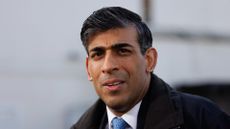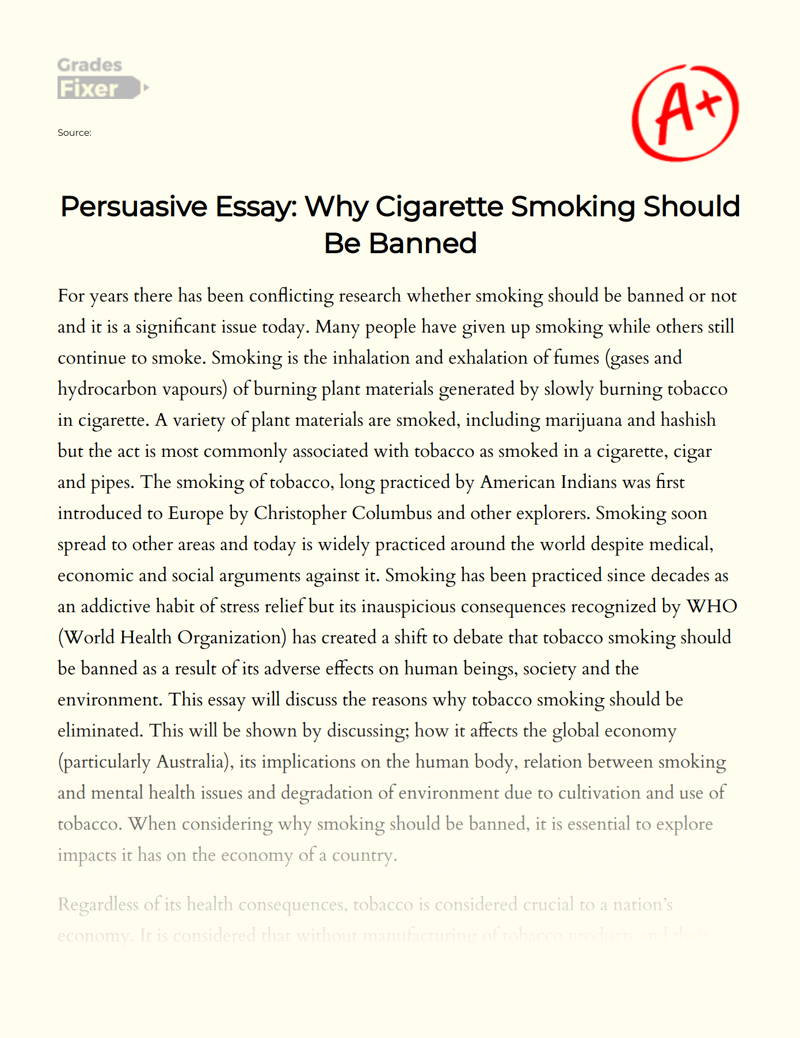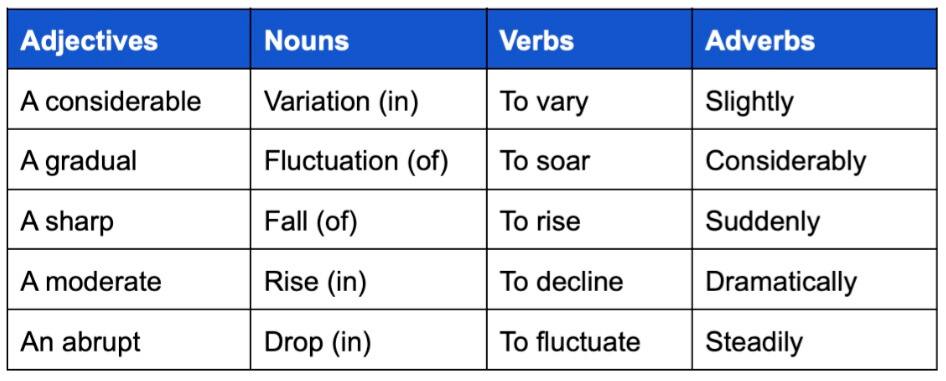Should Smoking Be Illegal?
Should smoking be banned? What are the pros and cons of banning cigarettes in public places? If you’re writing an argumentative essay or persuasive speech on why smoking should be banned, check out this sample.

Smoking Should Be Banned: Essay Introduction
Reasons why smoking should be banned, why smoking should not be banned: essay arguments, why smoking should be banned essay conclusion.
Smoking involves burning a substance to take in its smoke into the lungs. These substances are commonly tobacco or cannabis. Combustion releases the active substances in them, like nicotine, which are absorbed through the lungs.
A widespread technique through which this is done is via smoking manufactured cigarettes or hand-rolling the tobacco ready for smoking. Almost 1 billion people in the majority of all human societies practice smoking. Complications directly associated with smoking claim the lives of half of all the persons involved in smoking tobacco or marijuana for a long time.
Smoking is an addiction because tobacco contains nicotine, which is very addictive. The nicotine makes it difficult for a smoker to quit. Therefore, a person will become used to nicotine such that he/she has to smoke to feel normal. Consequently, I think smoking should be banned for some reason.
One reason why smoking should be banned is that it has got several health effects. It harms almost every organ of the body. Cigarette smoking causes 87% of lung cancer deaths and is also responsible for many other cancer and health problems.
Apart from this, infant deaths that occur in pregnant women are attributed to smoking. Similarly, people who stay near smokers become secondary smokers, who may breathe in the smoke and get the same health problems as smokers. Although not widely smoked, cannabis also has health problems, and withdrawal symptoms include depression, insomnia, frustration, anger, anxiety, concentration difficulties, and restlessness.
Besides causing emphysema, smoking also affects the digestive organs and the blood circulatory systems, especially heart arteries. Women have a higher risk of heart attack than men, exacerbating with time as one smokes. Smoking also affects the mouth, whereby the teeth become discolored, the lips blacken and always stay dry, and the breath smells bad.
Cigarette and tobacco products are costly. People who smoke are therefore forced to spend their money on these products, which badly wastes the income they would have otherwise spent on other things. Therefore, I think that smoking should be forbidden to reduce the costs of treating diseases related to smoking and the number of deaths caused by smoking-related illnesses.
However, tobacco and cigarette manufacturing nations would lose a lot if smoking was to be banned. I, therefore, think that it should not be banned. Some nations largely depend on exporting cigarettes and tobacco products to get revenue.
This revenue typically boosts the economy of such nations. If smoking were banned, they would incur significant losses since tobacco companies are multi-billion organizations. Apart from these, millions of people will be jobless due to the ban.
The process by which tobacco and cigarette products reach consumers is very complex, and it involves a chain process with several people involved in it. Banning smoking, therefore, means these people will lose their jobs, which most may depend on for their livelihoods.
In conclusion, the ban on smoking is a tough step to be undertaken, especially when the number of worldwide users is billions. Although it burdens nations enormously in treating smoking-related diseases, it may take a long time before a ban can work. Attempts by some nations to do this have often been met with failures.
Cite this paper
- Chicago (N-B)
- Chicago (A-D)
StudyCorgi. (2020, January 12). Should Smoking Be Illegal? https://studycorgi.com/should-smoking-be-banned/
"Should Smoking Be Illegal?" StudyCorgi , 12 Jan. 2020, studycorgi.com/should-smoking-be-banned/.
StudyCorgi . (2020) 'Should Smoking Be Illegal'. 12 January.
1. StudyCorgi . "Should Smoking Be Illegal?" January 12, 2020. https://studycorgi.com/should-smoking-be-banned/.
Bibliography
StudyCorgi . "Should Smoking Be Illegal?" January 12, 2020. https://studycorgi.com/should-smoking-be-banned/.
StudyCorgi . 2020. "Should Smoking Be Illegal?" January 12, 2020. https://studycorgi.com/should-smoking-be-banned/.
This paper, “Should Smoking Be Illegal?”, was written and voluntary submitted to our free essay database by a straight-A student. Please ensure you properly reference the paper if you're using it to write your assignment.
Before publication, the StudyCorgi editorial team proofread and checked the paper to make sure it meets the highest standards in terms of grammar, punctuation, style, fact accuracy, copyright issues, and inclusive language. Last updated: November 8, 2023 .
If you are the author of this paper and no longer wish to have it published on StudyCorgi, request the removal . Please use the “ Donate your paper ” form to submit an essay.
- Entertainment
- Environment
- Information Science and Technology
- Social Issues
Home Essay Samples Health Smoking
Why Smoking Should Not Be Banned
*minimum deadline
Cite this Essay
To export a reference to this article please select a referencing style below

- Reproductive Health
- Tobacco Use
Related Essays
Need writing help?
You can always rely on us no matter what type of paper you need
*No hidden charges
100% Unique Essays
Absolutely Confidential
Money Back Guarantee
By clicking “Send Essay”, you agree to our Terms of service and Privacy statement. We will occasionally send you account related emails
You can also get a UNIQUE essay on this or any other topic
Thank you! We’ll contact you as soon as possible.
An official website of the United States government
The .gov means it’s official. Federal government websites often end in .gov or .mil. Before sharing sensitive information, make sure you’re on a federal government site.
The site is secure. The https:// ensures that you are connecting to the official website and that any information you provide is encrypted and transmitted securely.
- Publications
- Account settings
Preview improvements coming to the PMC website in October 2024. Learn More or Try it out now .
- Advanced Search
- Journal List
- BMJ Open Access

Why ban the sale of cigarettes? The case for abolition
The cigarette is the deadliest artefact in the history of human civilisation. Most of the richer countries of the globe, however, are making progress in reducing both smoking rates and overall consumption. Many different methods have been proposed to steepen this downward slope, including increased taxation, bans on advertising, promotion of cessation, and expansion of smoke-free spaces. One option that deserves more attention is the enactment of local or national bans on the sale of cigarettes. There are precedents: 15 US states enacted bans on the sale of cigarettes from 1890 to 1927, for instance, and such laws are still fully within the power of local communities and state governments. Apart from reducing human suffering, abolishing the sale of cigarettes would result in savings in the realm of healthcare costs, increased labour productivity, lessened harms from fires, reduced consumption of scarce physical resources, and a smaller global carbon footprint. Abolition would also put a halt to one of the principal sources of corruption in modern civilisation, and would effectively eliminate one of the historical forces behind global warming denial and environmental obfuscation. The primary reason for abolition, however, is that smokers themselves dislike the fact they smoke. Smoking is not a recreational drug, and abolishing cigarettes would therefore enlarge rather than restrict human liberties. Abolition would also help cigarette makers fulfil their repeated promises to ‘cease production’ if cigarettes were ever found to be causing harm.
Six reasons to ban
The cigarette is the deadliest object in the history of human civilisation. Cigarettes kill about 6 million people every year, a number that will grow before it shrinks. Smoking in the twentieth century killed only 100 million people, whereas a billion could perish in our century unless we reverse course. 1 Even if present rates of consumption drop steadily to zero by 2100, we will still have about 300 million tobacco deaths this century.
The cigarette is also a defective product, meaning not just dangerous but unreasonably dangerous, killing half its long-term users. And addictive by design. It is fully within the power of the Food and Drug Administration in the US, for instance, to require that the nicotine in cigarettes be reduced to subcompensable, subaddictive levels. 2 3 This is not hard from a manufacturing point of view: the nicotine alkaloid is water soluble, and denicotinised cigarettes were already being made in the 19th century. 4 Philip Morris in the 1980s set up an entire factory to make its Next brand cigarettes, using supercritical fluid extraction techniques to achieve a 97% reduction in nicotine content, which is what would be required for a 0.1% nicotine cigarette, down from present values of about 2%. 5 Keep in mind that we're talking about nicotine content in the rod as opposed to deliveries measured by the ‘FTC method’, which cannot capture how people actually smoke. 5
Cigarettes are also defective because they have been engineered to produce an inhalable smoke. Tobacco smoke was rarely inhaled prior to the nineteenth century; it was too harsh, too alkaline. Smoke first became inhalable with the invention of flue curing , a technique by which the tobacco leaf is heated during fermentation, preserving the sugars naturally present in the unprocessed leaf. Sugars when they burn produce acids, which lower the pH of the resulting smoke, making it less harsh, more inhalable. There is a certain irony here, since these ‘milder’ cigarettes were actually far more deadly, allowing smoke to be drawn deep into the lungs. The world's present epidemic of lung cancer is almost entirely due to the use of low pH flue-cured tobacco in cigarettes, an industry-wide practice that could be reversed at any time. Regulatory agencies should mandate a significant reduction in rod-content nicotine, but they should also require that no cigarette be sold with a smoke pH lower than 8. Those two mandates alone would do more for public health than any previous law in history. 5
Death and product defect are two reasons to abolish the sale of cigarettes, but there are others. A third is the financial burden on public and private treasuries, principally from the costs of treating illnesses due to smoking. Cigarette use also results in financial losses from diminished labor productivity, and in many parts of the world makes the poor even poorer. 6
A fourth reason is that the cigarette industry is a powerful corrupting force in human civilisation. Big tobacco has corrupted science by sponsoring ‘decoy’ or ‘distraction research’, 5 but it has also corrupted popular media, insofar as newspapers and magazines dependent on tobacco advertising for revenues have been reluctant to publish critiques of cigarettes. 7 The industry has corrupted even the information environment of its own workforce, as when Philip Morris paid its insurance provider (CIGNA) to censor the health information sent to corporate employees. 8 Tobacco companies have bullied, corrupted or exploited countless other institutions: the American Medical Association, the American Law Institute, sports organisations, fire-fighting bodies, Hollywood, the US Congress—even the US presidency and US military. President Lyndon Johnson refused to endorse the 1964 Surgeon General's report, for instance, fearing alienation of the tobacco-friendly South. Cigarette makers managed even to thwart the US Navy's efforts to go smoke-free. In 1986, the Navy had announced a goal of creating a smoke-free Navy by the year 2000; tobacco-friendly congressmen were pressured to thwart that plan, and a law was passed requiring that all ships sell cigarettes and allow smoking. The result: American submarines were not smoke-free until 2011. 9
Cigarettes are also, though, a significant cause of harm to the natural environment. Cigarette manufacturing consumes scarce resources in growing, curing, rolling, flavouring, packaging, transport, advertising and legal defence, but also causes harms from massive pesticide use and deforestation. Many Manhattans of savannah woodlands are lost every year to obtain the charcoal used for flue curing. Cigarette manufacturing also produces non-trivial greenhouse gas emissions, principally from the fossil fuels used for curing and transport, fires from careless disposal of butts, and increased medical costs from maladies caused by smoking 5 (China produces 40 percent of the world's cigarettes, for example, and uses mainly coal to cure its tobacco leaf). And cigarette makers have provided substantial funding and institutional support for global climate change deniers, causing further harm. 10 Cigarettes are not sustainable in a world of global warming; indeed they are one of its overlooked and easily preventable causes.
But the sixth and most important reason for abolition is the fact that smokers themselves do not like their habit. This is a key point: smoking is not a recreational drug; most smokers do not like the fact they smoke and wish they could quit. This means that cigarettes are very different from alcohol or even marijuana. Only about 10–15% of people who drink liquor ever become alcoholics, versus addiction rates of 80% or 90% for people who smoke. 11 As an influential Canadian tobacco executive once confessed: smoking is not like drinking, it is rather like being an alcoholic. 12
The spectre of prohibition
An objection commonly raised is: Hasn't prohibition already been tried and failed? Won't this just encourage smuggling, organised crime, and yet another failed war on drugs? That has been the argument of the industry for decades; bans are ridiculed as impractical or tyrannical. (First they come for your cigarettes.…) 13
The freedom objection is weak, however, given how people actually experience addiction. Most smokers ‘enjoy’ smoking only in the sense that it relieves the pains of withdrawal; they need nicotine to feel normal. People who say they enjoy cigarettes are rather rare—so rare that the industry used to call them ‘enjoyers’. 14 Surveys show that most smokers want to quit but cannot; they also regret having started. 15 Tobacco industry executives have long grasped the point: Imperial Tobacco's Robert Bexon in 1984 confided to his Canadian cotobacconists that ‘If our product was not addictive we would not sell a cigarette next week’. 12 American cigarette makers have been quietly celebrating addiction since the 1950s, when one expressed how ‘fortunate for us’ it was that cigarettes ‘are a habit they can't break’. 16
Another objection commonly raised to any call for a ban is that this will encourage smuggling, or even organised crime. But that is rather like blaming theft on fat wallets. Smuggling is already rampant in the cigarette world, as a result of pricing disparities and the tolerance of contraband or even its encouragement by cigarette manufacturers. Luk Joossens and Rob Cunningham have shown how cigarette manufacturers have used smuggling to undermine monopolies or gain entry into new markets or evade taxation. 17 18 And demand for contraband should diminish, once the addicted overcome their addiction—a situation very different from prohibition of alcohol, where drinking was a more recreational drug. And of course, even a ban on the sale of cigarettes will not eliminate all smoking—nor should that be our goal, since people should still be free to grow their own for personal use. Possession should not be criminalised; the goal should only be a ban on sales. Enforcement, therefore, should be a trivial matter, as is proper in a liberal society.
Cigarette smoking itself, though, is less an expression of freedom than the robbery of it. And so long as we allow the companies to cast themselves as defenders of liberty, the table is unfairly tilted. We have to recognise that smoking compromises freedom, and that retiring cigarettes would enlarge human liberties.
Of course it could well be that product regulation, combined with taxation, denormalisation, and ‘smoke-free’ legislation, will be enough to dramatically lower or even eliminate cigarette use—over some period of decades. Here, though, I think we fail to realise how much power governments already have to act more decisively. From 1890 to 1927 the sale of cigarettes was banned virtually overnight in 15 different US states; and in Austin v. Tennessee (1900) the US Supreme Court upheld the right of states to enact such bans. 19 Those laws all eventually disappeared from industry pressure and the lure of tax revenues. 20 None was deemed unconstitutional, however, and some localities retained bans into the 1930s, just as some counties still today ban the sale of alcohol. Bhutan in 2004 became the first nation recently to ban the sale of cigarettes, and we may see other countries taking this step, especially once smoking prevalence rates start dropping into single digits.
Helping the industry fulfil its promises
One last rationale for a ban: abolition would fulfil a promise made repeatedly by the industry itself. Time and again, cigarette makers have insisted that if cigarettes were ever found to be causing harm they would stop making them:
- In March 1954, George Weissman, head of marketing at Philip Morris, announced that his company would ‘stop business tomorrow’ if ‘we had any thought or knowledge that in any way we were selling a product harmful to consumers’. 21
- In 1972, James C Bowling, vice president for public relations at Philip Morris, asserted publicly, and in no uncertain terms, that ‘If our product is harmful…we'll stop making it’. 22
- Helmut Wakeham, vice president for research at Philip Morris, in 1976 stated publicly that ‘if the company as a whole believed that cigarettes were really harmful, we would not be in the business. We are a very moralistic company’. 23
- RJ Reynolds president Gerald H Long, in a 1986 interview asserted that if he ever ‘saw or thought there were any evidence whatsoever that conclusively proved that, in some way, tobacco was harmful to people, and I believed it in my heart and my soul, then I would get out of the business’. 24
- Philip Morris CEO Geoffrey Bible in 1997, when asked (under oath) what he would do with his company if cigarettes were ever found to be causing cancer, said: ‘I'd probably…shut it down instantly to get a better hold on things’. 25 Bible was asked about this in Minnesota v. Philip Morris (2 March 1998) and reaffirmed that if even one person were ever found to have died from smoking he would ‘reassess’ his duties as CEO. 26
The clearest expression of such an opinion, however, was by Lorillard's president, Curtis H Judge, in an April 1984 deposition, where he was asked why he regarded Lorillard's position on smoking and health as important:
A: Because if we are marketing a product that we know causes cancer, I'd get out of the business…I wouldn't be associated with marketing a product like that.
A: If cigarettes caused cancer, I wouldn't be involved with them…I wouldn't sell a product that caused cancer.
Q: …Because you don't want to kill people? … Is that the reason?
Q: …If it was proven to you that cigarette smoking caused lung cancer, do you think cigarettes should be marketed?
A: No…No one should sell a product that is a proven cause of lung cancer. 27
Note that these are all public assurances , including several made under oath. All follow a script drawn up by the industry's public relations advisors during the earliest stages of the conspiracy: On 14 December 1953, Hill and Knowlton had proposed to RJ Reynolds that the cigarette maker reassure the public that it ‘would never market a product which is in any way harmful’. Reynolds was also advised to make it clear that
If the Company felt that its product were now causing cancer or any other disease, it would immediately cease production of it. 28
To this recommendation was added ‘Until such time as these charges or irresponsible statements are ever proven, the Company will continue to produce and market cigarettes’.
What is remarkable is that we never find the companies saying privately that they would stop making cigarettes—with two significant exceptions. In August 1947, in an internal document outlining plans to study ‘vascular and cardiac effects’ of smoking, Philip Morris's director of research, Willard Greenwald, made precisely this claim: ‘We certainly do not want any person to smoke if it is dangerous to his health’. 29 Greenwald had made a similar statement in 1939, reassuring his president, OH Chalkley, that ‘under no circumstances would we want anyone to smoke Philip Morris cigarettes were smoking definitely deleterious to his health’. 30 There is no reason to believe he was lying: he is writing long before Wynder's mouse painting experiments of 1953, and prior even to the epidemiology of 1950. Prior to obtaining proof of harm, Philip Morris seems honestly not to have wanted to sell a deadly product.
Abolition is not such a radical idea; it would really just help the industry fulfil its long-standing promises to the public. The cigarette, as presently constituted, is simply too dangerous—and destructive and unloved—to be sold.
Summary points
- The cigarette is the deadliest object in the history of human civilisation. It is also a defective product, a financial burden on cash-strapped societies, an important source of political and scientific corruption, and a cause of both global warming and global warming denial.
- Tobacco manufacturers have a long history of promising to stop the production of cigarettes, should they ever be proven harmful.
- The most important reason to ban the sale of cigarettes, however, is that most smokers do not even like the fact they smoke; cigarettes are not a recreational drug.
- It is not in principle difficult to end the sale of cigarettes; most communities–even small towns–could do this virtually overnight. We actually have more power than we realize to put an end this, the world's leading cause of death and disease.
Competing interests: The author has served as an expert witness for plaintiffs in tobacco litigation.
Provenance and peer review: Not commissioned; externally peer reviewed.
Open Access: This is an Open Access article distributed in accordance with the Creative Commons Attribution Non Commercial (CC BY-NC 3.0) license, which permits others to distribute, remix, adapt, build upon this work non-commercially, and license their derivative works on different terms, provided the original work is properly cited and the use is non-commercial. See: http://creativecommons.org/licenses/by-nc/3.0/
The pros and cons of a total smoking ban
Plans to phase out the sale of tobacco completely have won cross-party support
- Newsletter sign up Newsletter

Pro: saving lives
Con: black markets, pro: avoiding poverty, con: risk to civil liberties, pro: environmental protection, con: losing tax revenue.
Rishi Sunak's plans to phase out the sale of cigarettes appears to have gained cross-party backing, making a total smoking ban in the UK a real possibility.
The prime minister used his Conservative Party conference speech to announce plans to raise the age at which people can buy tobacco in England year by year until it applies to the whole population. This would mean a 14-year-old today will never legally be able to buy a cigarette, putting England on a par with the likes of New Zealand, which introduced a similar law last year, in having "some of the strictest smoking laws in the world", Sky News reported.
While an outright ban – even one introduced over several decades – may prove controversial, its chances of coming into law have received a boost after it won support from Labour, as well as Welsh and Scottish governments, where laws on smoking are devolved.
Subscribe to The Week
Escape your echo chamber. Get the facts behind the news, plus analysis from multiple perspectives.

Sign up for The Week's Free Newsletters
From our morning news briefing to a weekly Good News Newsletter, get the best of The Week delivered directly to your inbox.
"Political instincts on this issue are coalescing around a similar position," said BBC political editor Chris Mason, meaning the plan could be both "profound and long-lasting".
Almost six million people in England smoke, and tobacco remains the single biggest cause of preventable illness and death. Tobacco smoke can cause cancer, stroke and heart disease, with smoking-related illnesses costing the NHS £17 billion a year, according to campaign group Action on Smoking and Health (ASH).
An independent government-commissioned review , which last year recommended proposals similar to those announced by Sunak, argued that tackling tobacco use and supporting smokers to quit would help prevent 15 types of cancer – including lung cancer, throat cancer and acute myeloid leukaemia. Recent data showed that one in four deaths from all cancers were estimated to be from smoking.
Speaking on BBC Radio 4 's "Today" programme, the prime minister said his proposals represented the "biggest public health intervention in a generation", a claim backed up by England's chief medical officer, Sir Chris Whitty, who stressed how beneficial the health improvements would be.
Simon Clark, of smokers' lobby group Forest, told the BBC that "creeping prohibition won't stop young adults smoking" but it will "simply drive the sale of tobacco underground and consumers will buy cigarettes on the black market where no-one pays tax and products are completely unregulated".
The illicit trade in tobacco products "poses major health, economic and security concerns around the world", according to the World Health Organization , which estimates 1 in every 10 cigarettes and tobacco products consumed globally is illicit.
Writing for The Conversation , Dr Brendan Gogarty, of the University of Tasmania, argued that "laws that rely on prohibition to reduce the prevalence and harm from drugs generally fail to achieve their aims".
Smoking causes a disproportionate burden on the most disadvantaged families and communities, last year's independent review found. The average smoker in the North East of England spends over 10% of their income on tobacco, compared to just over 6% in the South East.
This mirrors research from 2015 conducted by University of Nottingham, which found parents who smoke were "plunging nearly half a million children into poverty", The Independent reported.
As smokers quit, said Sudyumna Dahal for The Conversation , household budgets "become easier, facilitating what a study in the British Medical Journal describes as an income transfer from male smokers to females and other family members".
Therefore, argue anti-smoking campaigners, banning smoking would bring greater benefits to the less well-off.
Smokers and the groups who advocate on their behalf argue that their habit is a civil right, even if it kills the smoker. In a report published in 2019, the smokers’ group Forest argued that "smokers are the canaries for civil liberties".
It added that the call for a ban "directly violates the harm principle that assumes a person has autonomy over their own life and body as long as they do not hurt other people".
As The Spectator editor Fraser Nelson pointed out on Twitter , plans to phase out the sale of cigarettes could lead to the absurd situation where pensioners will have to produce ID to prove which side of the ever-moving line of legality they are on.
"I'd love to live in a smoke-free world," wrote Rachael Bletchly in the Daily Mirror . "I wish people would stop wrecking their health with cigarettes. But I don't think it's the job of politicians to police other grown-ups' filthy habits. And I fear that Rishi Sunak's new smoking ban is just well-meaning, populist puff."
Cigarette smoking has several negative environmental impacts and banning smoking would bring these to an end. Smokers release pollution into the atmosphere, cigarette butts litter the environment, and the toxic chemicals in the residues cause soil and water pollution.
Tobacco is commonly planted in rainforest areas and has contributed to major deforestation, said Conserve Energy Future .
A 2013 report in the journal Tobacco Control found that cigarette manufacturing “consumes scarce resources in growing, curing, rolling, flavouring, packaging, transport, advertising and legal defence” and “also causes harms from massive pesticide use”.
Taxation on smoking raises more than £8.8 billion per year for the Treasury, noted Politics.co.uk . The TaxPayers’ Alliance rejected the argument that smokers also cost the taxman more due to their health burden, arguing that smokers who suffer major health problems are more likely to die prematurely, reducing expenditure on state pensions and other age-related benefits.
Sign up for Today's Best Articles in your inbox
A free daily email with the biggest news stories of the day – and the best features from TheWeek.com

Today's Newspapers A roundup of the headlines from the US front pages
By The Week Staff Published 16 May 24

Talking Point Fiona Harvey's interview on Piers Morgan Uncensored leads to more 'vitriol'
By The Week UK Published 16 May 24

Today's Big Question International criticism and a lack of progress in freeing hostages is piling pressure on the Israeli prime minister
By Richard Windsor, The Week UK Published 16 May 24

In Depth The former president is planning to fundamentally flip America's civil rights protections if he wins a second term in office
By Rafi Schwartz, The Week US Published 9 April 24

Today's Big Question US, UK and Australia seek to expand 'game-changer' defence partnership ahead of Republican's possible return to White House
By Sorcha Bradley, The Week UK Published 22 March 24

Instant Opinion Opinion, comment and editorials of the day
By Harold Maass, The Week US Published 21 March 24

Today's Big Question PM's pledge to deliver economic growth is 'in tatters' as stagnation and falling living standards threaten Tory election wipeout
By Harriet Marsden, The Week UK Published 16 February 24

By Harold Maass, The Week US Published 1 February 24

The Explainer Across England, local councils are suffering from grave financial problems
By The Week UK Published 28 January 24

Talking Point The Telegraph launches 'assault' on PM just as many Tory MPs are contemplating losing their seats
By Keumars Afifi-Sabet, The Week UK Published 26 January 24

Today's Big Question Re-election of Republican frontrunner could threaten UK security, warns former head of secret service
By Harriet Marsden, The Week UK Published 17 January 24
- Contact Future's experts
- Terms and Conditions
- Privacy Policy
- Cookie Policy
- Advertise With Us
The Week is part of Future plc, an international media group and leading digital publisher. Visit our corporate site . © Future US, Inc. Full 7th Floor, 130 West 42nd Street, New York, NY 10036.
Home — Essay Samples — Nursing & Health — Smoking — Effect of Tobacco: Why Cigarette Smoking Should Be Banned
Effect of Tobacco: Why Cigarette Smoking Should Be Banned
- Categories: Smoking Smoking Ban Tobacco
About this sample

Words: 1585 |
Published: Dec 3, 2020
Words: 1585 | Pages: 3 | 8 min read
Works Cited
- Rezaei, S., Akbari, M. E., Hajizadeh, M., & Heydari, G. (2015). The financial burden imposed on healthcare system due to smoking-attributable diseases: A report from Iran. Global Journal of Health Science, 7(2), 1-9. https://doi.org/10.5539/gjhs.v7n2p1
- World Health Organization. (2017). Tobacco. https://www.who.int/news-room/fact-sheets/detail/tobacco
- Centers for Disease Control and Prevention. (2022). Smoking & tobacco use: Health effects. https://www.cdc.gov/tobacco/data_statistics/fact_sheets/health_effects/effects_cig_smoking/index.htm
- Tobacco in Australia. (2021). Tobacco use in Australia. https://www.tobaccoinaustralia.org.au/chapter-1-prevalence/1-2-prevalence-of-smoking-adults
- American Cancer Society. (2022). Lung cancer risk factors. https://www.cancer.org/cancer/lung-cancer/prevention-and-early-detection/risk-factors.html
- National Institute on Drug Abuse. (2019). DrugFacts: Cigarettes and other tobacco products. https://www.drugabuse.gov/publications/drugfacts/cigarettes-other-tobacco-products
- National Cancer Institute. (2022). Harms of smoking and health benefits of quitting. https://www.cancer.gov/about-cancer/causes-prevention/risk/tobacco/cessation-fact-sheet
- U.S. Department of Health and Human Services. (2014). The health consequences of smoking—50 years of progress: A report of the Surgeon General. U.S. Department of Health and Human Services, Centers for Disease Control and Prevention, National Center for Chronic Disease Prevention and Health Promotion, Office on Smoking and Health.
- Gao, B., Chapman, S., & Sun, S. (2019). The tipping point for tobacco control: Time to prohibit the sale of tobacco products?. Tobacco Control, 28(3), 349-353. https://doi.org/10.1136/tobaccocontrol-2017-054108
- National Academies of Sciences, Engineering, and Medicine. (2018). Public health consequences of e-cigarettes. National Academies Press. https://doi.org/10.17226/24952

Cite this Essay
Let us write you an essay from scratch
- 450+ experts on 30 subjects ready to help
- Custom essay delivered in as few as 3 hours
Get high-quality help

Verified writer
- Expert in: Nursing & Health Law, Crime & Punishment

+ 120 experts online
By clicking “Check Writers’ Offers”, you agree to our terms of service and privacy policy . We’ll occasionally send you promo and account related email
No need to pay just yet!
Related Essays
3 pages / 1160 words
2 pages / 783 words
3 pages / 1162 words
2 pages / 1162 words
Remember! This is just a sample.
You can get your custom paper by one of our expert writers.
121 writers online

Still can’t find what you need?
Browse our vast selection of original essay samples, each expertly formatted and styled
Related Essays on Smoking
Vape has become one of the most popular means of smoking nowadays. People find that vaping is better than smoking cigarettes. Vape has many characteristics those attract people to take it instead of cigarettes. As people are [...]
In the "should smoking be illegal argumentative" debate, one of the primary concerns is the well-known harmful effects of cigarettes on the human body. Many people are aware that smoking cigarettes is detrimental. Cigarettes [...]
Good afternoon, ladies and gentlemen. Today, I would like to talk to you about the dangers of smoking and the impact it has on individuals and society as a whole. Smoking is a prevalent habit that has been around for centuries, [...]
Smoking is a prevalent practice in many societies, with approximately 1 billion people engaging in this habit. The act of smoking involves burning substances, such as tobacco or cannabis, and inhaling the resulting smoke into [...]
Stop smoking it can cost you your life! What is smoking? How can something small cause so much harm to the world? Smoking is an addictive drug that can cause death or cancer it has caused, More than 10 times as many U.S. [...]
Vaping is not a traditional smoking. Many of us don’t even consider it as a substitute of smoking. That’s why a large chunk of non-smokers get attracted towards vaping because it’s harmless, flavored, aromatic and obviously [...]
Related Topics
By clicking “Send”, you agree to our Terms of service and Privacy statement . We will occasionally send you account related emails.
Where do you want us to send this sample?
By clicking “Continue”, you agree to our terms of service and privacy policy.
Be careful. This essay is not unique
This essay was donated by a student and is likely to have been used and submitted before
Download this Sample
Free samples may contain mistakes and not unique parts
Sorry, we could not paraphrase this essay. Our professional writers can rewrite it and get you a unique paper.
Please check your inbox.
We can write you a custom essay that will follow your exact instructions and meet the deadlines. Let's fix your grades together!
Get Your Personalized Essay in 3 Hours or Less!
We use cookies to personalyze your web-site experience. By continuing we’ll assume you board with our cookie policy .
- Instructions Followed To The Letter
- Deadlines Met At Every Stage
- Unique And Plagiarism Free
- IELTS Scores
- Life Skills Test
- Find a Test Centre
- Alternatives to IELTS
- General Training
- Academic Word List
- Topic Vocabulary
- Collocation
- Phrasal Verbs
- Writing eBooks
- Reading eBook
- All eBooks & Courses
- Sample Essays
- Ban Smoking Essay
Ban Smoking in Public Places Essay
This is a ban smoking in public places essay. It is an example of an essay where you have to give your opinion as to whether you agree or disagree.
The sample answer shows you how you can present the opposing argument first, that is not your opinion, and then present your opinion in the following paragraph.

It is always a good idea to present a balanced essay which presents both sides of the argument, but you must always make it very clear what your opinion is and which side of the argument you support.
You should spend about 40 minutes on this task.
Write about the following topic:
Smoking not only harms the smoker, but also those who are nearby. Therefore, smoking should be banned in public places.
To what extent do you agree or disagree?
Give reasons for your answer and include any relevant examples from your own experience or knowledge.
Write at least 250 words.
Model Answer:
Medical studies have shown that smoking not only leads to health problems for the smoker, but also for people close by. As a result of this, many believe that smoking should not be allowed in public places. Although there are arguments on both sides, I strongly agree that a ban is the most appropriate course of action.
Opponents of such a ban argue against it for several reasons. Firstly, they say that passive smokers make the choice to breathe in other people’s smoke by going to places where it is allowed. If they would prefer not to smoke passively, then they do not need to visit places where smoking is permitted. In addition, they believe a ban would possibly drive many bars and pubs out of business as smokers would not go there anymore. They also argue it is a matter of freedom of choice. Smoking is not against the law, so individuals should have the freedom to smoke where they wish.
However, there are more convincing arguments in favour of a ban. First and foremost, it has been proven that tobacco consists of carcinogenic compounds which cause serious harm to a person’s health, not only the smoker. Anyone around them can develop cancers of the lungs, mouth and throat, and other sites in the body. It is simply not fair to impose this upon another person. It is also the case that people’s health is more important than businesses. In any case, pubs and restaurants could adapt to a ban by, for example, allowing smoking areas.
In conclusion, it is clear that it should be made illegal to smoke in public places. This would improve the health of thousands of people, and that is most definitely a positive development.
(290 words)
This essay is well organized and presented.
The introduction is clear - note how it follows the ban smoking in public places essay question - it paraphrases the information in order to introduce the topic and the argument.
The argument against a ban on smoking in public places is presented first. It is made clear that it is not the authors opinion by the topic sentence:
- "Opponents of such a ban argue against it for several reasons".
And also by the use of the word 'they' to refer to the opponents.
The writer then clearly shows they are moving on to the other argument which is their own (and it has clearly been stated in the thesis that this is their argument):
- "However, there are more convincing arguments in favour of a ban".
In this paragraph, 'they' is dropped because it is now the writers opinion.
<<< Back
Next >>>
More Agree / Disagree Essays:

Multinational Organisations and Culture Essay
Multinational Organisations and Culture Essay: Improve you score for IELTS Essay writing by studying model essays. This Essay is about the extent to which working for a multinational organisation help you to understand other cultures.

Airline Tax Essay: Would taxing air travel reduce pollution?
Airline Tax Essay for IELTS. Practice an agree and disagree essay on the topic of taxing airlines to reduce low-cost air traffic. You are asked to decide if you agree or disagree with taxing airlines in order to reduce the problems caused.

Sample IELTS Writing: Is spending on the Arts a waste of money?
Sample IELTS Writing: A common topic in IELTS is whether you think it is a good idea for government money to be spent on the arts. i.e. the visual arts, literary and the performing arts, or whether it should be spent elsewhere, usually on other public services.

Return of Historical Objects and Artefacts Essay
This essay discusses the topic of returning historical objects and artefacts to their country of origin. It's an agree/disagree type IELTS question.

Employing Older People Essay: Is the modern workplace suitable?
Employing Older People Essay. Examine model essays for IELTS Task 2 to improve your score. This essay tackles the issue of whether it it better for employers to hire younger staff rather than those who are older.

Internet vs Newspaper Essay: Which will be the best source of news?
A recent topic to write about in the IELTS exam was an Internet vs Newspaper Essay. The question was: Although more and more people read news on the internet, newspapers will remain the most important source of news. To what extent do you agree or disagree?

Human Cloning Essay: Should we be scared of cloning humans?
Human cloning essay - this is on the topic of cloning humans to use their body parts. You are asked if you agree with human cloning to use their body parts, and what reservations (concerns) you have.

Scientific Research Essay: Who should be responsible for its funding?
Scientific research essay model answer for Task 2 of the test. For this essay, you need to discuss whether the funding and controlling of scientific research should be the responsibility of the government or private organizations.

Examinations Essay: Formal Examinations or Continual Assessment?
Examinations Essay: This IELTS model essay deals with the issue of whether it is better to have formal examinations to assess student’s performance or continual assessment during term time such as course work and projects.

Dying Languages Essay: Is a world with fewer languages a good thing?
Dying languages essays have appeared in IELTS on several occasions, an issue related to the spread of globalisation. Check out a sample question and model answer.

Paying Taxes Essay: Should people keep all the money they earn?
Paying Taxes Essay: Read model essays to help you improve your IELTS Writing Score for Task 2. In this essay you have to decide whether you agree or disagree with the opinion that everyone should be able to keep their money rather than paying money to the government.

IELTS Sample Essay: Is alternative medicine ineffective & dangerous?
IELTS sample essay about alternative and conventional medicine - this shows you how to present a well-balanced argument. When you are asked whether you agree (or disagree), you can look at both sides of the argument if you want.

Role of Schools Essay: How should schools help children develop?
This role of schools essay for IELTS is an agree disagree type essay where you have to discuss how schools should help children to develop.

IELTS Internet Essay: Is the internet damaging social interaction?
Internet Essay for IELTS on the topic of the Internet and social interaction. Included is a model answer. The IELTS test usually focuses on topical issues. You have to discuss if you think that the Internet is damaging social interaction.

Free University Education Essay: Should it be paid for or free?
Free university education Model IELTS essay. Learn how to write high-scoring IELTS essays. The issue of free university education is an essay topic that comes up in the IELTS test. This essay therefore provides you with some of the key arguments about this topic.

Essay for IELTS: Are some advertising methods unethical?
This is an agree / disagree type question. Your options are: 1. Agree 100% 2. Disagree 100% 3. Partly agree. In the answer below, the writer agrees 100% with the opinion. There is an analysis of the answer.

IELTS Vegetarianism Essay: Should we all be vegetarian to be healthy?
Vegetarianism Essay for IELTS: In this vegetarianism essay, the candidate disagrees with the statement, and is thus arguing that everyone does not need to be a vegetarian.

Technology Development Essay: Are earlier developments the best?
This technology development essay shows you a complex IELTS essay question that is easily misunderstood. There are tips on how to approach IELTS essay questions

Truthfulness in Relationships Essay: How important is it?
This truthfulness in relationships essay for IELTS is an agree / disagree type essay. You need to decide if it's the most important factor.

Extinction of Animals Essay: Should we prevent this from happening?
In this extinction of animals essay for IELTS you have to decide whether you think humans should do what they can to prevent the extinction of animal species.
Any comments or questions about this page or about IELTS? Post them here. Your email will not be published or shared.
Before you go...
Check out the ielts buddy band 7+ ebooks & courses.

Would you prefer to share this page with others by linking to it?
- Click on the HTML link code below.
- Copy and paste it, adding a note of your own, into your blog, a Web page, forums, a blog comment, your Facebook account, or anywhere that someone would find this page valuable.
Band 7+ eBooks
"I think these eBooks are FANTASTIC!!! I know that's not academic language, but it's the truth!"
Linda, from Italy, Scored Band 7.5

IELTS Modules:
Other resources:.
- All Lessons
- Band Score Calculator
- Writing Feedback
- Speaking Feedback
- Teacher Resources
- Free Downloads
- Recent Essay Exam Questions
- Books for IELTS Prep
- Useful Links

Recent Articles
Useful Language for IELTS Graphs
May 16, 24 04:44 AM

Taking a Gap Year
May 14, 24 03:00 PM
IELTS Essay: Loving Wildlife and Nature
May 10, 24 02:36 AM
Important pages
IELTS Writing IELTS Speaking IELTS Listening IELTS Reading All Lessons Vocabulary Academic Task 1 Academic Task 2 Practice Tests
Connect with us
Copyright © 2022- IELTSbuddy All Rights Reserved
IELTS is a registered trademark of University of Cambridge, the British Council, and IDP Education Australia. This site and its owners are not affiliated, approved or endorsed by the University of Cambridge ESOL, the British Council, and IDP Education Australia.

How bad is vaping and should it be banned?
Professor at the National Drug Research Institute (Melbourne), Curtin University
PhD Candidate (Psychiatry) & Research Assistant, University of Newcastle
Disclosure statement
Nicole Lee works as a consultant in the health sector and a psychologist in private practice. She has previously received funding by Australian and state governments, NHMRC and other bodies for evaluation and research into alcohol and other drug prevention and treatment.
Brigid Clancy is an Associate at 360Edge, a drug and alcohol consultancy company.
University of Newcastle and Curtin University provide funding as members of The Conversation AU.
View all partners
Vaping regularly makes headlines, with some campaigning to make e-cigarettes more available to help smokers quit, while others are keen to see vaping products banned, citing dangers, especially for teens.
So just how dangerous is it? We have undertaken an evidence check of vaping research . This included more than 100 sources on tobacco harm reduction, vaping prevalence and health effects, and what other countries are doing in response. Here’s what we found.
How does vaping compare to smoking?
Smoking is harmful. It’s the leading preventable cause of death in Australia. It causes 13% of all deaths , including from lung, mouth, throat and bladder cancer, emphysema, heart attack and stroke, to name just a few. People who smoke regularly and don’t quit lose about ten years of life compared with non-smokers.
Nicotine, a mild stimulant, is the active ingredient in both cigarettes and nicotine vaping products. It’s addictive but isn’t the cause of cancer or the other diseases related to smoking.
Ideally, people wouldn’t be addicted to nicotine, but having a safe supply without the deadly chemicals, for instance by using nicotine patches or gum, is safer than smoking. Making these other sources available is known as “harm reduction”.
Vaping is not risk-free, but several detailed reviews of the evidence plus a consensus of experts have all estimated it’s at least 95% safer to vape nicotine than to smoke tobacco. The risk of cancer from vaping, for example, has been estimated at less than 1%.
These reviews looked at the known dangerous chemicals in cigarettes, and found there were very few and in very small quantities in nicotine vapes. So the argument that we won’t see major health effects for a few more decades is causing more alarm than is necessary.

Is ‘everyone’ vaping these days?
Some are concerned about the use of vaping products by teens, but currently available statistics show very few teens vape regularly. Depending on the study, between 9.6% and 32% of 14-17-year-olds have tried vaping at some point in their lives.
But less than 2% of 14-17-year-olds say they have used vapes in the past year. This number doubled between 2016 and 2019, but is still much lower than the rates of teen smoking (3.2%) and teen alcohol use (32%).
It’s the same pattern we see with drugs other than alcohol: a proportion of people try them but only a very small proportion of those go on to use regularly or for a long time. Nearly 60% of people who try vaping only use once or twice .
Smoking rates in Australia have declined from 24% in 1991 to 11% in 2019 because we have introduced a number of very successful measures such as restricting sales and where people can smoke, putting up prices, introducing plain packaging, and improving education and access to treatment programs.
But it’s getting harder to encourage the remaining smokers to quit with the methods that have worked in the past. Those still smoking tend to be older , more socially disadvantaged , or have mental health problems.
Read more: My teen's vaping. What should I say? 3 expert tips on how to approach 'the talk'
Should we ban vapes?
So we have a bit of a dilemma. Vaping is much safer than smoking, so it would be helpful for adults to have access to it as an alternative to cigarettes. That means we need to make them more available and accessible.
But ideally we don’t want teens who don’t already smoke to start regular vaping. This has led some to call for a “ crackdown ” on vaping.
But we know from a long history of drug prohibition - like alcohol prohibition in the 1920s - that banning or restricting vaping could actually do more harm than good.
Banning drugs doesn’t stop people using them - more than 43% of Australians have tried an illicit drug at least once. And it has very little impact on the availability of drugs.
But prohibition does have a number of unintended consequences, including driving drugs underground and creating a black market or increasing harms as people switch to other drugs, which are often more dangerous.
The black market makes drugs more dangerous because there is no way to control quality. And it makes it easier, not harder, for teens to access them, because there are no restrictions on who can sell or buy them.
Read more: Learning about the health risks of vaping can encourage young vapers to rethink their habit
Are our current laws working?
In 2021, Australia made it illegal to possess and use nicotine vaping products without a prescription. We are the only country in the world to take this path.
The problem is even after more than a year of this law, only 8.6% of people vaping nicotine have a prescription, meaning more than 90% buy them illegally.
Anecdotal reports even suggest an increase in popularity of vaping among teens since these laws were introduced. At best, they are not helping.
It may seem counterintuitive, but the way to reduce the black market is to make quality-controlled vapes and liquids more widely available, but restricted to adults. If people could access vaping products legally they wouldn’t buy them on the black market and the black market would decline.
We also know from many studies on drug education in schools that when kids get accurate, non-sensationalised information about drugs they tend to make healthier decisions. Sensationalised information can have the opposite effect and increase interest in drugs . So better education in schools and for parents and teachers is also needed, so they know how to talk to kids about vaping and what to do if they know someone is vaping.
What have other countries done?
Other countries allow vapes to be legally sold without a prescription, but impose strict quality controls and do not allow the sale of products to people under a minimum age. This is similar to our regulation of cigarettes and alcohol.
The United Kingdom has minimum standards on manufacturing, as well as restrictions on purchase age and where people can vape.
Aotearoa New Zealand introduced a unique plan to reduce smoking rates by imposing a lifetime ban on buying cigarettes. Anyone born after January 1 2009 will never be able to buy cigarettes, so the minimum age you can legally smoke keeps increasing. At the same time, NZ increased access to vaping products under strict regulations on manufacture, purchase and use.
As of late last year, all US states require sellers to have a retail licence, and sales to people under 21 are banned. There are also restrictions on where people can vape.
A recent study modelled the impact of increasing access to nicotine vaping products in Australia. It found it’s likely there would be significant public health benefits by relaxing the current restrictive policies and increasing access to nicotine vaping products for adults.
The question is not whether we should discourage teens from using vaping products or whether we should allow wider accessibility to vaping products for adults as an alternative to smoking. The answer to both those questions is yes.
The key question is how do we do both effectively without one policy jeopardising the outcomes of the other?
If we took a pragmatic harm-reduction approach, as other countries have done, we could use our very successful model of regulation of tobacco products as a template to achieve both outcomes.
Read more: It's safest to avoid e-cigarettes altogether – unless vaping is helping you quit smoking
- Tobacco control

Case Management Specialist

Lecturer / Senior Lecturer - Marketing

Assistant Editor - 1 year cadetship

Executive Dean, Faculty of Health

Lecturer/Senior Lecturer, Earth System Science (School of Science)
Conclusion of Smoking Should Be Banned on College Campuses Essay
Introduction, arguments in favor of smoking in campus, arguments against smoking in campus, reconciliation of the two positions, campus smoking: conclusion of the essay, works cited.
The idea of smoking in colleges and campuses has developed a mixed reaction in the USA and in many other parts of the world such that it has posed a very hot and contentious universal debate.
Several campuses and colleges have tried to impose a total ban on smoking within their environs, some of them succeeding while others failing to do so. For instance, colleges like Santa Ana and Fullerton have managed to ban smoking completely within their environs, while others such as Huntington Beach and Golden West College still allow smoking in prescribed places such as in parking lots.
Fullerton College was the first to successfully impose a smoking ban in the year 2007 (Bates 57). Nevertheless, many colleges and campuses have not managed to follow suit because of some state laws which assert that smoking is only proscribed inside buildings and within 20 feet from entry points of buildings in all campuses. These laws continue to give students the right to smoke within certain areas of their campuses.
As aforementioned, section 7595 of the government code affirms that smoking is proscribed only in public buildings and within 20 feet from entry points of buildings in all campuses (Merrill 36).Therefore, the opponents of this subject believe that since it is the right of every citizen to do anything that is recognized as legal, it is very wrong to impose a total ban on smoking, especially in campuses.
The most important thing is to ensure that students follow the laid down rules and regulations such as the strict use of the recommended areas of smoking. In deed, it is very unfair to send students off campus to smoke.
In addition, the opponents of this argument believe that smoking should not be banned because it helps students to relax whenever they are in stressful situations. Concerning the health risks that are brought about by smoking, they assert that every mature citizen should be in a position to separate good behavior from wrong behavior.
They say that since there has been an integration of cigarette smoking topics in schools for several decades, by the time a student reaches campus, he/she must be in a position to understand the risks that cigarette smoking poses to their health and therefore they should be able to make informed decisions about smoking. They also argue that it is very unfair to impose an immediate ban on cigarette smoking in campus yet it is clearly understood that smoking is an additive activity which can not be stopped at once.
Even though campus students have the right to smoke within some prescribed areas whenever they wish to do so, as mandated by some state laws, they ought to realize the fact that cigarette smoking has got very serious and detrimental effects on human health. Smoking of cigarettes can bring about lung infections to both first-hand and second-hand smokers. Therefore, smokers need to recognize that their right to smoke may greatly infringe on the rights of their non-smoking counterparts.
It is obvious that students know the negative effects of smoking cigarettes. For instance, it is expensive for them and it may also reduce their lifetime. Generally speaking, cigarette smoking is just bad. Currently, at least forty three colleges in the USA have imposed a total ban on cigarette smoking in their campuses and this trend is increasing especially among commuter schools and community colleges (Merrill 40).
However, it is hard to impose such a ban in some colleges because of the mixed reactions that are held by different stakeholders about the issue of smoking, and the existing campus policies which give the smokers the right to smoke in prescribed areas. According to the research that was carried out by the U.S. Department of Health and Human services, 31% of college students smoke cigarettes. This figure exceeds the national general average of 25% (Longmire 15).
It is also worth to note that even though there has been an integration of cigarette smoking topics in schools for several decades, cigarette smoking has continued to attract many youths and this continues to raise a lot of alarm about their future. This is because cigarette smoking is the major contributor of the cases of lung cancer in the entire world.
Research indicates that close to eighty percent of men who die from lung cancer, and seventy five percent of women who die from the same disease do so because of smoking tobacco. Research also indicates that the risk of lung cancer increases when a person starts smoking at an early age, and with an increase in the number of cigarettes that a person smokes in a day (Robicsek 56).
Scientific research has proved that cigarette smoking is harmful to the body. The smoke that comes out of a burning cigarette is a compound mixture of several chemicals which are produced when tobacco is burned.
This smoke contains a deadly compound called tar, which consists of more than four thousand chemicals which are very poisonous, and a majority of them have been clearly identified to be the main cause of cancer. Most of these chemicals are also known to cause lung diseases and heart problems. Some of these chemicals include cyanide, benzene, methanol, ammonia, formaldehyde and acetylene (Merrill 45).
Other deadly substances that are found in cigarettes include carbon monoxide and nitrogen oxide gases which are very poisonous. The most active component of a cigarette is nicotine. Nicotine is a very addictive compound. Cigarette smoking can cause several problems such as cancer, lung damage and heart infections among many other diseases.
Research also indicates that more than thirty percent of the deaths that result in the United States occur due to the use of tobacco. Cigarette smoking also causes eighty seven percent of the deaths that result due to lung cancer. Other types of tobacco-related cancers include mouth cancer, cancer of the larynx, cancer of the throat and esophagus and cancer of the bladder. There is also a very close connection between cigarette smoking and the occurrence of the cancers of the kidney, pancreas, stomach and the cervix.
Cigarette smoking can also cause lung damage which begins at the early stages of smoking. Cigarette smokers encounter many problems with their lungs as compared to non-smokers and this situation gets worse when an individual increases his/her capacity to smoke. Smoking is linked to many dangerous lung infections which are just as perilous as lung cancer. These infections include emphysema and chronic bronchitis which cause difficulties in breathing and may even cause death.
Cigarette smoking also augments the risk of heart infections which stand out as the major causes of deaths in the U.S. Out of all the risk factors of heart infections, i.e. excess cholesterol, diabetes, obesity, cigarette smoking, physical lethargy and high blood pressure, cigarette smoking remains the leading risk factor for impulsive deaths that result from heart attacks (Bates 78).
In addition, low levels of cigarette smoking which may not be able to cause lung infections are capable of damaging the heart. Therefore, second-hand smokers also stand a very high chance of getting heart infections.
As stated earlier, Section 7595 of the government code affirms that smoking is proscribed in all public buildings and within 20 feet from entry points of buildings in all campuses (Merrill 36). Even though this ruling is good, it is not sufficient because it seems to discriminate the innocent second-hand smokers who continue to suffer from cigarette smoke which pollutes the air around them.
Cigarette smoking has also very detrimental effects to the real smokers and therefore they should be able to accept this ban because it is meant for their own good. Though it is very hard to ban citizens from doing something which is legally right, smoking should be gradually banned in campuses so as to protect the non-smokers. This is because campuses are public places which consist of both smokers and non-smokers.
My stand on this issue differs significantly from my opponents who believe that smoking should be allowed in some prescribed areas in campuses. My stand is that cigarette smoking should be banned in campuses because it impacts negatively on the non-smokers. Banning of cigarette smoking in campuses would enable the non-smoking citizens to enjoy the delight of breathing unpolluted air.
Nevertheless, my stand does not include cigarette smoking in private places such as in homes. At the same time, cigarette smokers should understand that the non-smokers are not trying to be intolerant when they keep on complaining about them. Rather, they are doing it for the sake of their own health.
In conclusion, smoking should be totally banned in campuses and colleges because of its severe health risks to both smokers and non-smokers. The health risks are much more to non-smokers because they may double up especially to those who already suffer from other ailments such as heart and lung problems.
In addition, a very short exposure by a non-smoker to secondhand smoke may have abrupt severe effects on his/her cardiovascular system thus escalating the risk for lung and heart infections. This makes the non-smoker to have a higher risk of catching infections from cigarette smoke than the real smoker yet he/she is very innocent. A more effective way of reducing smoking in campuses would be to provide tobacco termination counseling programs in the campuses.
Bates, Tim & Gordon Mangan. Smoking and Raven IQ. New York: Pocket Books, 2007.
Longmire, Wilkinson, & Torok Edgar. Oxford Handbook of Clinical Medicine. Oxford: Oxford University Press, 2006.
Melo, Maurice. Cigarette Smoking and Reproductive Function. Oxford: Oxford University Press, 2009.
Merrill, David. How Cigarettes are made. London: Oxford University Press, 2000.
Robicsek, Francis. Ritual Smoking in Central America. Cambridge: Cambridge University Press, 2008.
- Chicago (A-D)
- Chicago (N-B)
IvyPanda. (2018, June 29). Conclusion of Smoking Should Be Banned on College Campuses Essay. https://ivypanda.com/essays/smoking-on-campus-should-be-banned/
"Conclusion of Smoking Should Be Banned on College Campuses Essay." IvyPanda , 29 June 2018, ivypanda.com/essays/smoking-on-campus-should-be-banned/.
IvyPanda . (2018) 'Conclusion of Smoking Should Be Banned on College Campuses Essay'. 29 June.
IvyPanda . 2018. "Conclusion of Smoking Should Be Banned on College Campuses Essay." June 29, 2018. https://ivypanda.com/essays/smoking-on-campus-should-be-banned/.
1. IvyPanda . "Conclusion of Smoking Should Be Banned on College Campuses Essay." June 29, 2018. https://ivypanda.com/essays/smoking-on-campus-should-be-banned/.
Bibliography
IvyPanda . "Conclusion of Smoking Should Be Banned on College Campuses Essay." June 29, 2018. https://ivypanda.com/essays/smoking-on-campus-should-be-banned/.
- Understanding Advertising: Second-Hand Smoking
- Ethical Problem of Smoking
- Smoking Ban in the United States of America
- American History: The Problem of Education in American Culture
- Education in Afghanistan Before the Taliban
- Time Management: Lesson Pacing
- Truancy in Schools
- Drug Test for Teachers and Athletes in Schools
Top Streams
- Data Science Courses in USA
- Business Analytics Courses in USA
- Engineering Courses in USA
- Tax Courses in USA
- Healthcare Courses in USA
- Language Courses in USA
- Insurance Courses in USA
- Digital Marketing Courses in USA
Top Specialization
- Masters in Data Analytics in USA
- Masters in Mechanical Engineering in USA
- Masters in Supply Chain Management in USA
- Masters in Computer Science in USA
- MBA in Finance in USA
- Masters in Architecture in USA
Top Universities
- Cornell University
- Yale University
- Princeton University
- University of California Los Angeles
- University of Harvard
- Stanford University
- Arizona State University
- Northeastern University
- Project Management Courses in Australia
- Accounting Courses in Australia
- Medical Courses in Australia
- Psychology Courses in Australia
- Interior Designing Courses in Australia
- Pharmacy Courses in Australia
- Social Work Courses in Australia
- MBA in Australia
- Masters in Education in Australia
- Masters in Pharmacy in Australia
- Masters in Information Technology in Australia
- BBA in Australia
- Masters in Teaching in Australia
- Masters in Psychology in Australia
- University of Melbourne
- Deakin University
- Carnegie Mellon University
- Monash University
- University of Sydney
- University of Queensland
- RMIT University
- Macquarie University
- Data Science Courses in Canada
- Business Management Courses in Canada
- Supply Chain Management Courses in Canada
- Project Management Courses in Canada
- Business Analytics Courses in Canada
- Hotel Management Courses in Canada
- MBA in Canada
- MS in Canada
- Masters in Computer Science in Canada
- Masters in Management in Canada
- Masters in Psychology in Canada
- Masters in Education in Canada
- MBA in Finance in Canada
- Masters in Business Analytics in Canada
- University of Toronto
- University of British Columbia
- McGill University
- University of Alberta
- York University
- University of Calgary
- Algoma University
- University Canada West
- Project Management Courses in UK
- Data Science Courses in UK
- Public Health Courses in UK
- Digital Marketing Courses in UK
- Hotel Management Courses in UK
- Nursing Courses in UK
- Medicine Courses in UK
- Interior Designing Courses in UK
- Masters in Computer Science in UK
- Masters in Psychology in UK
- MBA in Finance in UK
MBA in Healthcare Management in UK
- Masters in Education in UK
- Masters in Marketing in UK
- MBA in HR in UK
- University of Oxford
- University of Cambridge
- Coventry University
- University of East London
- University of Hertfordshire
- University of Birmingham
- Imperial College London
- University of Glasgow
Top Resources
- Universities in Germany
- Study in Germany
- Masters in Germany
- Courses in Germany
- Bachelors in Germany
- Germany Job Seeker Visa
- Cost of Living in Germany
Best Universities in Germany
Top courses.
- Masters in Data Science in Germany
- MS in Computer Science in Germany
- Marine Engineering in Germany
- MS Courses in Germany
- Masters in Psychology in Germany
- Hotel Management Courses in Germany
- Masters in Economics in Germany
- Paramedical Courses in Germany
- Karlsruhe Institute of Technology
- University of Bonn
- University of Freiburg
- University of Hamburg
- University of Stuttgart
- Saarland University
- Mannheim University
- MBA in Ireland
- Phd in Ireland
- Masters in Computer Science Ireland
- Cyber Security in Ireland
- Masters in Data Analytics Ireland
- Ms in Data Science in Ireland
- Pharmacy courses in ireland
- Business Analytics Course in Ireland
- Universities in Ireland
- Study in Ireland
- Masters in Ireland
- Courses in Ireland
- Bachelors in Ireland
- Cost of Living in Ireland
- Ireland Student Visa
- Part Time Jobs in Ireland
- Trinity College Dublin
- University College Dublin
- Dublin City University
- University of Limerick
- Dublin Business School
- Maynooth University
- University College Cork
- National College of Ireland
Colleges & Courses
- Masters in France
- Phd in France
- Study Medicine in France
- Best Universities in Frankfurt
- Best Architecture Colleges in France
- ESIGELEC France
- Study in France for Indian Students
- Intakes in France
- SOP for France Visa
- Study in France from India
- Reasons to Study in France
- How to Settle in France
More About France
- Cost of Living in France
- France Study Visa
- Cost of Living in Frankfurt
- France Scholarship for Indian Students
- Part Time Jobs in France
- Stay Back in France After Masters
About Finland
- Universities in Finland
- Study in Finland
- Courses in Finland
- Bachelor Courses in Finland
- Masters Courses in Finland
- Cost of Living in Finland
- MS in Finland
- Average Fees in Finland Universities
- PhD in Finland
- Bachelor Degree in Medicine & Surgery
- MBBS Courses in Georgia
- MBBS Courses in Russia
- Alte University
- Caucasus University
- Georgian National University SEU
- David Tvildiani Medical University
- Caspian International School Of Medicine
- Asfendiyarov Kazakh National Medical University
- Kyrgyz State Medical Academy
- Cremeia Federal University
- Bashkir State Medical University
- Kursk State Medical University
- Andijan State Medical Institute
- IELTS Syllabus
- IELTS Prepration
- IELTS Eligibility
- IELTS Test Format
- IELTS Band Descriptors
- IELTS Speaking test
- IELTS Writing Task 1
- IELTS score validity
- IELTS Cue Card
IELTS Reading Answers Sample
- Animal Camouflage
- Types Of Societies
- Australia Convict Colonies
- A Spark A Flint
- Emigration To The Us
- The History Of Salt
- Zoo Conservation Programmes
- The Robots Are Coming
- The Development Of Plastic

IELTS Speaking Cue Card Sample
- Describe A Puzzle You Have Played
- Describe A Long Walk You Ever Had
- Describe Your Favourite Movie
- Describe A Difficult Thing You did
- Describe A Businessman You Admire
- Memorable Day in My Life
- Describe Your Dream House
- Describe A Bag You Want to Own
- Describe a Famous Athlete You Know
- Aquatic Animal
IELTS Essay Sample Sample
- Best Education System
- IELTS Opinion Essay
- Agree or Disagree Essay
- Problem Solution Essays
- Essay on Space Exploration
- Essay On Historical Places
- Essay Writing Samples
- Tourism Essay
- Global Warming Essay
- GRE Exam Fees
- GRE Exam Syllabus
- GRE Exam Eligibility
- Sections in GRE Exam
- GRE Exam Benefits
- GRE Exam Results
- GRE Cutoff for US Universities
- GRE Preparation
- Send GRE scores to Universities
GRE Exam Study Material
- GRE Verbal Preparation
- GRE Study Material
- GRE AWA Essays
- GRE Sample Issue Essays
- Stanford University GRE Cutoff
- Harvard University GRE Cutoff
- GRE Quantitative Reasoning
- GRE Verbal Reasoning
- GRE Reading Comprehension
- Prepare for GRE in 2 months
Other Resources
- Documents Required For Gre Exam
- GRE Exam Duration
- GRE at Home
- GRE vs GMAT
- Improve GRE Verbal Scores
Free GRE Ebooks
- GRE Preparation Guide (Free PDF)
- GRE Syllabus (Free PDF)
- GMAT Eligibility
- GMAT Syllabus
- GMAT Exam Dates
- GMAT Registration
- GMAT Exam Fees
- GMAT Sections
- GMAT Purpose
GMAT Exam Study Material
- How to prepare for GMAT?
- GMAT Score Validity
- GMAT Preparation Books
- GMAT Preparation
- GMAT Exam Duration
- GMAT Score for Harvard
- GMAT Reading Comprehension
- GMAT Retake Strategy
Free GMAT Ebooks
- GMAT Guide PDF
- Download GMAT Syllabus PDF
- TOEFL Exam Registration
- TOEFL Exam Eligibility
- TOEFL Exam Pattern
- TOEFL Exam Preparation
- TOEFL Exam Tips
- TOEFL Exam Dates
- Documents for TOEFL Exam
- TOEFL Exam Fee
TOEFL Exam Study Material
- TOEFL Preparation Books
- TOEFL Speaking Section
- TOEFL Score and Results
- TOEFL Writing Section
- TOEFL Reading Section
- TOEFL Listening Section
- TOEFL Vocabulary
- Types of Essays in TOEFL
Free TOEFL Ebooks
- TOEFL Exam Guide (Free PDF)
- PTE Exam Dates
- PTE Exam Syllabus
- PTE Exam Eligibility Criteria
- PTE Test Centers in India
- PTE Exam Pattern
- PTE Exam Fees
- PTE Exam Duration
- PTE Exam Registration
PTE Exam Study Material
- PTE Exam Preparation
- PTE Speaking Test
- PTE Reading Test
- PTE Listening Test
- PTE Writing Test
- PTE Essay Writing
- PTE exam for Australia
Free PTE Ebooks
- PTE Syllabus (Free PDF)
- Duolingo Exam
- Duolingo Test Eligibility
- Duolingo Exam Pattern
- Duolingo Exam Fees
- Duolingo Test Validity
- Duolingo Syllabus
- Duolingo Preparation
Duolingo Exam Study Material
- Duolingo Exam Dates
- Duolingo Test Score
- Duolingo Test Results
- Duolingo Test Booking
Free Duolingo Ebooks
- Duolingo Guide (Free PDF)
- Duolingo Test Pattern (Free PDF)
NEET & MCAT Exam
- NEET Study Material
- NEET Preparation
- MCAT Eligibility
- MCAT Preparation
SAT & ACT Exam
- ACT Eligibility
- ACT Exam Dates
- SAT Syllabus
- SAT Exam Pattern
- SAT Exam Eligibility
USMLE & OET Exam
- USMLE Syllabus
- USMLE Preparation
- USMLE Step 1
- OET Syllabus
- OET Eligibility
- OET Prepration
PLAB & LSAT Exam
- PLAB Exam Syllabus
- PLAB Exam Fees
- LSAT Eligibility
- LSAT Registration
- TOEIC Result
- Study Guide
Application Process
- LOR for Masters
- SOP Samples for MS
- LOR for Phd
- SOP for Internship
- SOP for Phd
- Check Visa Status
- Motivation Letter Format
- Motivation Letter for Internship
- F1 Visa Documents Checklist
Career Prospects
- Popular Courses after Bcom in Abroad
- Part Time Jobs in Australia
- Part Time Jobs in USA
- Salary after MS in Germany
- Salary after MBA in Canada
- Average Salary in Singapore
- Higher Studies after MBA in Abroad
- Study in Canada after 12th
Trending Topics
- Best Education System in World
- Best Flying Schools in World
- Top Free Education Countries
- Best Countries to Migrate from India
- 1 Year PG Diploma Courses in Canada
- Canada Vs India
- Germany Post Study Work Visa
- Post Study Visa in USA
- Data Science Vs Data Analytics
- Public Vs Private Universities in Germany
- Universities Vs Colleges
- Difference Between GPA and CGPA
- Undergraduate Vs Graduate
- MBA in UK Vs MBA in USA
- Degree Vs Diploma in Canada
- IELTS vs TOEFL
- Duolingo English Test vs. IELTS
- Why Study in Canada
- Cost of Living in Canada
- Education System in Canada
- SOP for Canada
- Summer Intake in Canada
- Spring Intake in Canada
- Winter Intake in Canada
- Accommodation in Canada for Students
- Average Salary in Canada
- Fully Funded Scholarships in Canada
- Why Study in USA
- Cost of Studying in USA
- Spring Intake in USA
- Winter Intake in USA
- Summer Intake in USA
- STEM Courses in USA
- Scholarships for MS in USA
- Acceptable Study Gap in USA
- Interesting Facts about USA
- Free USA course
- Why Study in UK
- Cost of Living in UK
- Cost of Studying in UK
- Education System in UK
- Summer Intake in UK
- Spring Intake in UK
- Student Visa for UK
- Accommodation in UK for Students
- Scholarships in UK
- Why Study in Germany
- Cost of Studying in Germany
- Education System in Germany
- SOP for Germany
- Summer Intake in Germany
- Winter Intake in Germany
- Study Visa for Germany
- Accommodation in Germany for Students
- Free Education in Germany
Country Guides
- Study in UK
- Study in Canada
- Study in USA
- Study in Australia
- SOP Samples for Canada Student Visa
- US F1 Visa Guide for Aspirants
Exams Guides
- Duolingo Test Pattern
Recommended Reads
- Fully Funded Masters Guide
- SOP Samples For Australia
- Scholarships for Canada
- Data Science Guide
- SOP for MS in Computer Science
- Study Abroad Exams
- Alumni Connect
- Booster Program
- Scholarship
GPA CALCULATOR Convert percentage marks to GPA effortlessly with our calculator!
Expense calculator plan your study abroad expenses with our comprehensive calculator, ielts band calculator estimate your ielts band score with our accurate calculator, education loan calculator discover your eligible loan amount limit with our education calculator, university partner explore growth and opportunities with our university partnership, accommodation discover your perfect study abroad accommodation here, experience-center discover our offline centers for a personalized experience, our offices visit us for expert study abroad counseling..
- 18002102030
- Study Abroad
Should Smoking Be Banned In Public Places Essay - Samples and Tips for IELTS
- IELTS Preparation
- IELTS E-Books
- IELTS Registration
- IELTS Exam Fee
- IELTS Exam Dates 2024
- Documents Required
- IELTS Test Centers
- Test Format
- Band Descriptors
- IELTS Speaking Test
- General Reading Test
- General Writing Task
- IELTS Coaching
- Types of Essays
- IELTS for Australia
- IELTS Results
- Generation Gap Essay
- GPA Calculator
- Study Abroad Consultant In India
- Study Visa Consultants in India
Updated on 27 January, 2024

Anupriya Mukherjee
Sr. content writer.
IELTS or the International English language Testing System is one of the most popular and standardized tests to measure the English language proficiency of non-native English speakers. The IELTS writing section has two tasks, and task 2 is an essay writing question. Here, an essay topic will be given and you need to write an essay in response to it. The should smoking be banned in public places essay has been asked multiple times in the IELTS writing test over the years.
The test-takers need to practice common topics related to general and controversial issues. The relevant essay questions may change, but the main topic often remains the same.
Applicants must develop ideas and provide relevant examples to write a winning essay on topics related to questions like should smoking be banned in public places? The essay writing module is a challenging task and needs thorough preparation. Let us take a look at some of the smoking should be banned in public places IELTS essay samples and some tips to ace the task.
Table of Contents
Sample essay:, download e-books for ielts preparation, download ielts sample papers.
- Tips to write a winning IELTS essay on ' should smoking be banned in public places
Frequently Asked Questions
Learn more about study abroad, popular study abroad destinations, sample 1 on s hould smoking be banned in public places essay.
Some say 'smoking in public areas should be banned' while others go against the ban. Discuss both sides and give your opinion.
Tip: It is an opinion-based topic. Here, both sides need to be discussed, and finally, the opinion of the test-taker should be discussed.
Smoking is quite common among the younger generations today. But it has detrimental health impacts on both the smoker and any other person that inhales the smoke. The idea that 'smoking in public should be banned, is supported as well as opposed by many people. I believe smoking in public cannot be completely banned but there can be a middle path.
There are convincing arguments in favor of the ban because smoking ultimately leads to serious health crises. Supporters of the ban have various reasons to state.
Firstly, smoking is injurious to health. The main cause of lung cancer is smoking tobacco. Active smokers also suffer from other diseases like tuberculosis and heart problems. The symptoms may take time to show up but it eventually leads to a major crisis. It does not affect only the smoker, but also the people around the smoker. Both active and passive smokers can fall ill, and this calls for huge support for a blanket ban on smoking in public places.
Secondly, smoking is an addiction that influences non-smokers too. Anything that becomes an addiction is not at all safe and it tends to spread quickly. Peer and colleague group influences are very common in forming smoking habits. It is very easy to pick up smoking when one stays among smokers for long. People spend plenty of time in public areas, hence, smoking should be banned in public areas to avoid such negative influences.
Lastly, non-smokers feel very stressed when among smokers. It becomes difficult for pregnant women, senior citizens, and children, to adjust to an environment that is filled with cigarette smoke. It irritates non-smokers of various age groups. Smoking in public should be banned as it leads to annoyance to a large extent.
Nevertheless, some people oppose this ban too.
Firstly, they are unhappy about giving away their rights to smoke. They believe that such a ban would make them feel deprived of their individual rights.
Secondly, people against the ban on smoking in public areas say that cigarettes are sold and advertised publicly, and banning them will not make any difference. “Why can’t the government ban cigarettes completely if smoking in public is not allowed?”
Thirdly, they argue on terms like it becomes difficult to give up due to addiction. There are many incidents where severe health conditions are reported by active smokers, due to nicotine withdrawal. It is not easy to give up on smoking if someone does it regularly.
Fourthly, it will be an expensive affair to ban public smoking and impose new rules. Hence, they feel that the best solution is to keep active smokers separated from the general public.
Considering both sides of the argument, I feel there should be designated smoking zones in public areas. The bus stands, shopping malls, restaurants, and offices must have separate smoking zones so that addicted smokers are not affected or deprived.
Important Resources to Read:

Sample 2 on ‘smoking should be banned in public places IELTS essay’
Some businesses restrict smoking inside office spaces. Do you agree or disagree with this step taken by the businesses? Give reasons for your opinion.
Sample essay:
Corporate offices often see groups of individuals discussing issues while smoking. Is it a habit or does smoking actually help you brainstorm? Well, for non-smokers it should be banned, and for smokers, it is almost office culture.
Many companies, firms, and government offices have imposed restrictions on smoking inside office spaces. I feel it can be addressed with some other effective measures.
There are certain seemingly positive sides to smoking during work hours. It is believed that smoking improves concentration and helps the employees relax after long meetings or completion of projects. There is constant stress regarding deadlines, appraisal, and targets at work. In such a scenario, smoking is supposed to reduce stress.
Nicotine is a stimulant and smoking during office hours might keep employees in an active and elevated mood. Some projects may demand employees to stay awake late at night and work. In such a situation, employees don't feel drowsy and sleepy due to the nicotine boost.
Despite all these positive sides, there are alarming negative aspects too.
Firstly, smoking is harmful to health. It is one of the main reasons behind the increasing number of lung cancer cases globally. Diseases like tuberculosis and various cardiovascular health issues are caused by prolonged smoking habits. It does not only affect the smoker but also the people who spend time around smokers. Passive smokers face detrimental impacts too when they come in contact with smokers.
Secondly, the non-smokers feel uncomfortable in public spaces filled with cigarette smoke. It causes them stress. It is also very annoying, particularly for pregnant women and senior citizens in the office areas.
The debate between smokers and non-smokers can stop only when the authorities plan something fruitful. A strict ban on smoking will do no good. It will instill a sense of anger and disappointment among smokers if their rights are taken away suddenly. Similarly, the health impact of passive smokers cannot be ignored. In my opinion, office spaces and public areas should have separate smoking zones. This way, non-smokers will not have any problems and smokers can also relax.
You Can Also Read Sample Questions and Answers For The IELTS Passage: G reen Wave Washes Over Mainstream Shopping

Recommended Reads:
Tips to write a winning IELTS essay on ' should smoking be banned in public places
- The time allotted for the task 2 essay is 40 minutes and no extra time is allowed.
- The minimum word limit for an essay is 250 words but there is no upper word limit. It is recommended to write a little more than the prescribed limit.
- Organize the entire essay in 3 parts, introduction, body, and conclusion. In the introduction is a clear overview of the entire topic. The body is an analysis of facts and the conclusion should contain the opinion and summing up points.
- Paraphrasing is important. It increases the readability of the essay.
- Write short, crisp, and to-the-point sentences. Do not write complicated and lengthy sentences.
- Answer all the parts of the questions. Refer to the first sample below, which has three parts - 1. agree in favor of why smoking should be banned 2. disagree in context to why smoking should not be banned 3. your own opinion.
- If you are using any facts or statistical data, you need to be sure about them.
- Idioms make your write-up colorful and accurate. You need to know them well before you use them.
- Use collocations wherever needed. Use connectors and linking words but do not stuff them unnecessarily.
- Be careful about the punctuation.
- Present all your ideas in the right flow. The ideas, concepts, and experiences should be relevant to the topic.
- Maintain a semi-formal tone. Do not use any informal and personal phrases.
- Proofread your essay once you are done with the writing. This will help you scan mistakes in your essay.
- When you practice a particular topic you must focus on learning all the relevant vocabulary related to it.
- Check spellings, you should not make spelling errors. Use only those words that you are 100% sure of.
- Practice all kinds of essays. You can get pattern questions like advantages, disadvantages, opinions, causes and effects, causes and solutions, and direct questions.
- The conclusion is very important. The way you sum up your opinion will matter in boosting your IELTS band.
- Get your practice essays checked by an expert or any IELTS experienced professional you might know.
It is important to practice and prepare for a winning IELTS essay. The IELTS writing task is very important as it measures the writing skills of non-native English speakers. Go through all the samples and tips on should smoking be banned in public places essay to write well. For any assistance regarding the IELTS essays, applicants can get in touch with academic counselors of upGrad Abroad.
Also Reads:
How does smoking in public places affect the environment?
Smoking cigarettes or other tobacco products in public has an adverse effect upon the environment. It leads to pollution and releases toxic air and polluting agents into the atmosphere. The cigarette butts also pile up, littering several areas and the chemicals contained in the same are toxic. When they leach into water and soil, they end up contaminating the entire ecosystem, leading to pollution of the water and soil alike. Smoking is also an irritant for others if done in public.
How does smoking affect the society & community?
Smoking has a widespread impact on the community and society at large. Smoking in public releases toxic and harmful air into the atmosphere while also contributing towards increasing the pollutant counts in the air. It also leads to contamination of the soil and water through the littering of cigarette butts.
Exposure to second-hand smoke is also physically harmful for others in public. Smoking contributes towards respiratory disorders and air pollution as well. It also enhances the risks of various ailments and fatalities in society at large.
What are the arguments for and against banning smoking in all public places?
The arguments for banning smoking in public places are the following:
- Smoking leads to air pollution and releases toxic air into the atmosphere.
- Littering of cigarette butts leads to widespread soil and water contamination.
- Smoking leads to serious diseases and respiratory illnesses for others owing to their exposure to second-hand smoke.
- Smoking leads to a higher incidence of heart attacks, lung cancer and other disease which de-stabilize major chunks of communities, leading to higher healthcare costs for Governments and more strain on healthcare resources.
The arguments against banning smoking in public places are the following:
- Smoking bans do not usually have the intended effect, i.e. getting people to cut down or give up smoking.
- It may be perceived as an infringement of the freedom and rights of citizens.
- It will lead to lower tax revenues for Governments, limiting their public spending as a result.
- It will not be good for several businesses as well, especially in the food and beverages sector.
Why smoking should be banned in public places ielts essay?
Smoking is a social evil that is greatly impacting the society and community at large. At the individual and organizational levels, much more needs to be done for combating the harmful incidence of rising smoking levels amongst people in multiple age groups. Smoking causes innumerable ailments and diseases, while exposing people to harmful passive smoke and pollutes the air considerably. It also contributes towards soil and air pollution. I feel that smoking should be banned in public places owing to its negative effects on entire communities.
Smoking should be banned in public places because of the pollution it creates. Firstly, it leads to the release of toxic smoke and other pollutants into the atmosphere. Secondly, littering of cigarette butts leads to soil and water contamination alike. Thirdly, people who are non-smokers, are exposed to passive smoke for no fault of theirs and contract respiratory ailments in turn. Fourthly, banning public smoking will lower the incidence of fatalities and serious disease, lowering the strain on Governmental healthcare resources and costs of the same.
Banning public smoking will also set a more positive example for the younger generations who will be less likely to pick up the habit. Hence, I firmly believe that Governments should set examples by banning public smoking and setting the tone for a healthier tomorrow.
Here are few of the trending IELTS Reading Answers:
- The Life And Work Of Marie Curie Reading Answers
- Why Pagodas Don't Fall Down
- Spoken Corpus Comes To Life Reading Answers
- Striking Back At Lightning With Lasers IELTS Reading Answers
- The Context Meaning And Scope Of Tourism Reading Answers
- A Spark A Flint IELTS Reading Answers
- The Concept Of Role Theory Reading Answers
- Micro Enterprise Credit For Street Youth Reading Answers
- When Evolution Runs Backwards IELTS
- The Impact Of Wilderness Tourism IELTS Reading Answers
- The Truth About The Environment Reading Answers
- The Politics Of Pessimism Reading Answer
- The Rocket From East To West Reading Answers
- Glass Capturing The Dance Of Light
- Population Movements And Genetics Reading Answers
- The Megafires Of California Reading Answers
What is Scholarship
Learn all about the scholarships like types of scholarships and how to get a one
Provincial Nominee Program Canada
Learn all about Provincial Nominee Program (PNP) Canada
Fulbright Scholarship
Learn about the eligibility, benefits, procedure etc about Fulbright Scholarships
Education Loan for Study Abroad
Learn about educational loans, types, amount, eligibility & more in this article.
Best Universities in Australia
Learn about best universities in Australia along with other information
SEVIS Fees for F1 Visa
Learn about SEVIS fees amount & how to pay SEVIS fee here.
Learn more about the best universities in Germany for higher education
Learn all about USMLE exam here including USMLE steps, process & more
Letter of Recommendation (LOR)
Find our all about an LOR and also how to effectively write an LOR
Best Courses After 12th Commerce in USA
Know about the best courses to study in the USA after 12th commerce.
MBA Jobs in Australia for Indians
Know about the best-paying jobs after an MBA in Australia
Best Courses After 12th Arts in USA
Know the study options in USA for Indian students after completing 12th from Arts
Narotam Sekhsaria Scholarship
Narotam Sekhsaria scholarships are available for Indian students to apply for
What is SDS and Non SDS Visa
Difference between SDS and Non-SDS visa applications, their requirements & more.
MBA in healthcare management in the UK and the scope of work after graduating.
PR in Canada
How to get Canada PR from India along with the key factors, process and cost
CRS Score Calculator
Learn more about CRS of Canada’s Express Entry program.
MBA Fees in Canada
Learn about all the costs involved in pursuing an MBA in Canada.
What to Do After BCom
Popular courses after BCom abroad that you can opt for. Read to know!
Vidya Lakshmi Education Loan
Study abroad by applying for a student loan at the Vidya Lakshmi Portal.

Study in Canada & Save up to 20 Lakhs with upGrad Abroad

Study in Australia & Save up to 20 Lakhs with upGrad Abroad

Study in the USA & Save up to 20 Lakhs with upGrad Abroad

Study in Germany & Save up to 20 Lakhs with upGrad Abroad

Study in Ireland & Save up to 20 Lakhs with upGrad Abroad

Study in UK & Save up to 20 Lakhs with upGrad Abroad
Anupriya Mukherjee is a passion-driven professional working as a Content Marketer and earlier worked as a Digital Marketeer. With around 6 years of work experience, she has experience creating high-quality, engaging content for websites, blogs, news articles, video scripts, brochures, and ebooks.
Important Exams
Important resources for ielts, free study abroad counselling, trending searches, editor's pick, other countries.
- Masters in Accounting
- Bachelors in Aviation
- MA in Communication
- BSc in Nursing
- La Trobe University
- Masters in Public Health in Australia
- University of Melbourne Courses
- University of Adelaide
- Masters in Business Analytics in Australia
- Masters in Australia
- Courses in Australia
- Universities in Australia
- MS in Australia
- Nursing Courses in Australia
- Masters in Data Science in Canada
- University of Saskatchewan
- University of Manitoba
- Concordia University
- Masters in Canada
- Courses in Canada
- University of Victoria
- Trent University
- University of Windsor
- Thompson Rivers University
- Universities in Canada
- Courses in UK
- Northumbria University Ranking
- University of Leicester
- Kings College London
- Manchester Metropolitan University Ranking
- De Montfort University
- Bachelors in UK
- University of Oxford Courses
- Liverpool John Moores University Ranking
- University of Cambridge Courses
- Queen Mary University of London
- Masters in UK
- University of Bristol
- University of Leicester Ranking
- University of West London Ranking
- University of Strathclyde Ranking
- University of Sussex Ranking
- Queen Mary University of London Ranking
- Birmingham City University
- Universities in UK
- Purdue University
- DePaul University
- University of Dayton ranking
- University of Texas at Dallas ranking
- Bachelors in USA
- Pace University
- Northeastern University acceptance rate
- Columbia University Ranking
- Saint Louis University
- New York University Ranking
- DePaul University Ranking
- masters in computer science in usa
- Drexel University Ranking
- Masters in USA
- George Mason University ranking
- University of South Florida ranking
- Columbia University Acceptance Rate
- Saint Louis University Ranking
- Universities in USA
- University of Texas at Arlington ranking
- Northeastern University ranking
- New York University
- Purdue University ranking
- University at Buffalo
- Courses in USA
- George Mason University
- GRE Waived University In Usa
- 22 July IELTS Exam
- IELTS Common Speaking Topics
- Duolingo Exam Fee
- Top Phrases for IELTS Speaking Test
- Duolingo vs IELTS
- Universities in Canada Without IELTS
- IELTS Writing Task 2 Topics
- How to download IELTS Scorecard
- Gre Exam Fee in India
- Duolingo Certificate
- Duolingo Accepted Universities In Canada
- IELTS Speaking Scores
- IELTS Introduction Sample
- SAT Exam Syllabus
- Gmat Syllabus
- IELTS Band Score Chart
- Usmle Test Centers In India
- CEFR Level in IELTS
- MBA In UK Without Gmat
- Duolingo Accepted Universities In Australia
- Minimum IELTS Score For Canada
- Technological University Dublin
- Masters Courses in Netherlands
- Maynooth University Courses
- University of Europe for Applied Sciences Acceptance Rate
- Technological University Dublin Courses
- Business Courses in Ireland
- Dundalk Institute of Technology
- Courses in Netherlands
- Dublin City University Courses
- University of Limerick Courses
- Study in Netherlands
- National University of Ireland Galway Courses
- Universities in Netherlands
- Dundalk Institute of Technology Courses
The above tips are the Author's experiences. upGrad does not guarantee scores or admissions.
Call us to clear your doubts at:
Download our App
- Grievance Redressal
- Experience Centers
- Terms of Use
- Privacy Policy
- University Partner
- Accommodation
- IELTS Band Calculator
- Download Study Abroad App
- Education Loan Calculator
- upGrad Abroad Office
- Expense Calculator
- Knowledge Base
- Business Partner
Top Destinations
Masters programs.
- MBA in Germany, IU
- MIM in Germany, IU
- MS in CS in Germany, IU
- MS in Data Analytics in USA, Clark University
- MS in Project Management in USA, Clark University
- MS in IT in USA, Clark University
- MS in Data Analytics & Visualization in USA, Yeshiva University
- MS in Artificial Intelligence in USA, Yeshiva University
- MS in Cybersecurity, Yeshiva University
Study Abroad Important Blogs
- Cost of Study:
- Cost of Studying in Canada
- Cost of Studying in Ireland
- Cost of Studying in Australia
- Cost of living:
- Cost of living in UK
- Cost of living in Australia
- Cost of living in Germany
- Cost of living in Ireland
- Cost of living in Canada
- Career Opportunities:
- Career Opportunities in Australia
- Career Opportunities in Germany
- Job Opportunities in After MS in Canada
- Job Opportunities After MBA in Australia
- Job Opportunities After MS in UK
- IELTS Exam Resources:
- Academic IELTS
- IELTS Band Score
- IELTS Writing Task 2
- IELTS Slot Booking
- IELTS Score for UK
- IELTS Score for USA
- Validity of IELTS Score
- IELTS Speaking Topics
- IELTS Reading Tips
- How to Prepare for IELTS at Home Without Coaching
- IELTS Preparation Books
- Types of IELTS Exam
- IELTS Academic vs General
- IELTS Exam Pattern
- IELTS Essay
- IELTS Exam Dates
- Top Streams:
- Fashion Designing Courses in Australia
- Accounting Courses in Canada
- Management Courses in Canada
IELTS Mentor "IELTS Preparation & Sample Answer"
- Skip to content
- Jump to main navigation and login
Nav view search
- IELTS Sample
IELTS Writing Task 2/ Essay Topics with sample answer.
Ielts writing task 2 sample 740 - smoking should be banned in public places, ielts writing task 2/ ielts essay:, smoking not only harms the smoker, but also those who are nearby. therefore, smoking should be banned in public places..
IELTS Materials
- IELTS Bar Graph
- IELTS Line Graph
- IELTS Table Chart
- IELTS Flow Chart
- IELTS Pie Chart
- IELTS Letter Writing
- IELTS Essay
- Academic Reading
Useful Links
- IELTS Secrets
- Band Score Calculator
- Exam Specific Tips
- Useful Websites
- IELTS Preparation Tips
- Academic Reading Tips
- Academic Writing Tips
- GT Writing Tips
- Listening Tips
- Speaking Tips
- IELTS Grammar Review
- IELTS Vocabulary
- IELTS Cue Cards
- IELTS Life Skills
- Letter Types

- Privacy Policy
- Cookie Policy
- Copyright Notice
- HTML Sitemap
Log in using your username and password
- Search More Search for this keyword Advanced search
- Latest content
- Current issue
- Anniversary
- BMJ Journals More You are viewing from: Google Indexer
You are here
- Volume 22, Issue suppl 1
- Why ban the sale of cigarettes? The case for abolition
- Article Text
- Article info
- Citation Tools
- Rapid Responses
- Article metrics
- Robert N Proctor
- Correspondence to Dr Robert N Proctor, Department of History, Stanford University, Bldg 200, Stanford, CA 94305, USA; rproctor{at}stanford.edu
The cigarette is the deadliest artefact in the history of human civilisation. Most of the richer countries of the globe, however, are making progress in reducing both smoking rates and overall consumption. Many different methods have been proposed to steepen this downward slope, including increased taxation, bans on advertising, promotion of cessation, and expansion of smoke-free spaces. One option that deserves more attention is the enactment of local or national bans on the sale of cigarettes. There are precedents: 15 US states enacted bans on the sale of cigarettes from 1890 to 1927, for instance, and such laws are still fully within the power of local communities and state governments. Apart from reducing human suffering, abolishing the sale of cigarettes would result in savings in the realm of healthcare costs, increased labour productivity, lessened harms from fires, reduced consumption of scarce physical resources, and a smaller global carbon footprint. Abolition would also put a halt to one of the principal sources of corruption in modern civilisation, and would effectively eliminate one of the historical forces behind global warming denial and environmental obfuscation. The primary reason for abolition, however, is that smokers themselves dislike the fact they smoke. Smoking is not a recreational drug, and abolishing cigarettes would therefore enlarge rather than restrict human liberties. Abolition would also help cigarette makers fulfil their repeated promises to ‘cease production’ if cigarettes were ever found to be causing harm.
- Denormalization
- Tobacco Industry Documents
This is an open-access article distributed under the terms of the Creative Commons Attribution Non-commercial License, which permits use, distribution, and reproduction in any medium, provided the original work is properly cited, the use is non commercial and is otherwise in compliance with the license. See: http://creativecommons.org/licenses/by-nc/3.0/ and http://creativecommons.org/licenses/by-nc/3.0/legalcode
https://doi.org/10.1136/tobaccocontrol-2012-050811
Statistics from Altmetric.com
Request permissions.
If you wish to reuse any or all of this article please use the link below which will take you to the Copyright Clearance Center’s RightsLink service. You will be able to get a quick price and instant permission to reuse the content in many different ways.
Six reasons to ban
The cigarette is the deadliest object in the history of human civilisation. Cigarettes kill about 6 million people every year, a number that will grow before it shrinks. Smoking in the twentieth century killed only 100 million people, whereas a billion could perish in our century unless we reverse course. 1 Even if present rates of consumption drop steadily to zero by 2100, we will still have about 300 million tobacco deaths this century.
The cigarette is also a defective product, meaning not just dangerous but unreasonably dangerous, killing half its long-term users. And addictive by design. It is fully within the power of the Food and Drug Administration in the US, for instance, to require that the nicotine in cigarettes be reduced to subcompensable, subaddictive levels. 2 , 3 This is not hard from a manufacturing point of view: the nicotine alkaloid is water soluble, and denicotinised cigarettes were already being made in the 19th century. 4 Philip Morris in the 1980s set up an entire factory to make its Next brand cigarettes, using supercritical fluid extraction techniques to achieve a 97% reduction in nicotine content, which is what would be required for a 0.1% nicotine cigarette, down from present values of about 2%. 5 Keep in mind that we're talking about nicotine content in the rod as opposed to deliveries measured by the ‘FTC method’, which cannot capture how people actually smoke. 5
Cigarettes are also defective because they have been engineered to produce an inhalable smoke. Tobacco smoke was rarely inhaled prior to the nineteenth century; it was too harsh, too alkaline. Smoke first became inhalable with the invention of flue curing , a technique by which the tobacco leaf is heated during fermentation, preserving the sugars naturally present in the unprocessed leaf. Sugars when they burn produce acids, which lower the pH of the resulting smoke, making it less harsh, more inhalable. There is a certain irony here, since these ‘milder’ cigarettes were actually far more deadly, allowing smoke to be drawn deep into the lungs. The world's present epidemic of lung cancer is almost entirely due to the use of low pH flue-cured tobacco in cigarettes, an industry-wide practice that could be reversed at any time. Regulatory agencies should mandate a significant reduction in rod-content nicotine, but they should also require that no cigarette be sold with a smoke pH lower than 8. Those two mandates alone would do more for public health than any previous law in history. 5
Death and product defect are two reasons to abolish the sale of cigarettes, but there are others. A third is the financial burden on public and private treasuries, principally from the costs of treating illnesses due to smoking. Cigarette use also results in financial losses from diminished labor productivity, and in many parts of the world makes the poor even poorer. 6
A fourth reason is that the cigarette industry is a powerful corrupting force in human civilisation. Big tobacco has corrupted science by sponsoring ‘decoy’ or ‘distraction research’, 5 but it has also corrupted popular media, insofar as newspapers and magazines dependent on tobacco advertising for revenues have been reluctant to publish critiques of cigarettes. 7 The industry has corrupted even the information environment of its own workforce, as when Philip Morris paid its insurance provider (CIGNA) to censor the health information sent to corporate employees. 8 Tobacco companies have bullied, corrupted or exploited countless other institutions: the American Medical Association, the American Law Institute, sports organisations, fire-fighting bodies, Hollywood, the US Congress—even the US presidency and US military. President Lyndon Johnson refused to endorse the 1964 Surgeon General's report, for instance, fearing alienation of the tobacco-friendly South. Cigarette makers managed even to thwart the US Navy's efforts to go smoke-free. In 1986, the Navy had announced a goal of creating a smoke-free Navy by the year 2000; tobacco-friendly congressmen were pressured to thwart that plan, and a law was passed requiring that all ships sell cigarettes and allow smoking. The result: American submarines were not smoke-free until 2011. 9
Cigarettes are also, though, a significant cause of harm to the natural environment. Cigarette manufacturing consumes scarce resources in growing, curing, rolling, flavouring, packaging, transport, advertising and legal defence, but also causes harms from massive pesticide use and deforestation. Many Manhattans of savannah woodlands are lost every year to obtain the charcoal used for flue curing. Cigarette manufacturing also produces non-trivial greenhouse gas emissions, principally from the fossil fuels used for curing and transport, fires from careless disposal of butts, and increased medical costs from maladies caused by smoking 5 (China produces 40 percent of the world's cigarettes, for example, and uses mainly coal to cure its tobacco leaf). And cigarette makers have provided substantial funding and institutional support for global climate change deniers, causing further harm. 10 Cigarettes are not sustainable in a world of global warming; indeed they are one of its overlooked and easily preventable causes.
But the sixth and most important reason for abolition is the fact that smokers themselves do not like their habit. This is a key point: smoking is not a recreational drug; most smokers do not like the fact they smoke and wish they could quit. This means that cigarettes are very different from alcohol or even marijuana. Only about 10–15% of people who drink liquor ever become alcoholics, versus addiction rates of 80% or 90% for people who smoke. 11 As an influential Canadian tobacco executive once confessed: smoking is not like drinking, it is rather like being an alcoholic. 12
The spectre of prohibition
An objection commonly raised is: Hasn't prohibition already been tried and failed? Won't this just encourage smuggling, organised crime, and yet another failed war on drugs? That has been the argument of the industry for decades; bans are ridiculed as impractical or tyrannical. (First they come for your cigarettes.…) 13
The freedom objection is weak, however, given how people actually experience addiction. Most smokers ‘enjoy’ smoking only in the sense that it relieves the pains of withdrawal; they need nicotine to feel normal. People who say they enjoy cigarettes are rather rare—so rare that the industry used to call them ‘enjoyers’. 14 Surveys show that most smokers want to quit but cannot; they also regret having started. 15 Tobacco industry executives have long grasped the point: Imperial Tobacco's Robert Bexon in 1984 confided to his Canadian cotobacconists that ‘If our product was not addictive we would not sell a cigarette next week’. 12 American cigarette makers have been quietly celebrating addiction since the 1950s, when one expressed how ‘fortunate for us’ it was that cigarettes ‘are a habit they can't break’. 16
Another objection commonly raised to any call for a ban is that this will encourage smuggling, or even organised crime. But that is rather like blaming theft on fat wallets. Smuggling is already rampant in the cigarette world, as a result of pricing disparities and the tolerance of contraband or even its encouragement by cigarette manufacturers. Luk Joossens and Rob Cunningham have shown how cigarette manufacturers have used smuggling to undermine monopolies or gain entry into new markets or evade taxation. 17 , 18 And demand for contraband should diminish, once the addicted overcome their addiction—a situation very different from prohibition of alcohol, where drinking was a more recreational drug. And of course, even a ban on the sale of cigarettes will not eliminate all smoking—nor should that be our goal, since people should still be free to grow their own for personal use. Possession should not be criminalised; the goal should only be a ban on sales. Enforcement, therefore, should be a trivial matter, as is proper in a liberal society.
Cigarette smoking itself, though, is less an expression of freedom than the robbery of it. And so long as we allow the companies to cast themselves as defenders of liberty, the table is unfairly tilted. We have to recognise that smoking compromises freedom, and that retiring cigarettes would enlarge human liberties.
Of course it could well be that product regulation, combined with taxation, denormalisation, and ‘smoke-free’ legislation, will be enough to dramatically lower or even eliminate cigarette use—over some period of decades. Here, though, I think we fail to realise how much power governments already have to act more decisively. From 1890 to 1927 the sale of cigarettes was banned virtually overnight in 15 different US states; and in Austin v. Tennessee (1900) the US Supreme Court upheld the right of states to enact such bans. 19 Those laws all eventually disappeared from industry pressure and the lure of tax revenues. 20 None was deemed unconstitutional, however, and some localities retained bans into the 1930s, just as some counties still today ban the sale of alcohol. Bhutan in 2004 became the first nation recently to ban the sale of cigarettes, and we may see other countries taking this step, especially once smoking prevalence rates start dropping into single digits.
Helping the industry fulfil its promises
One last rationale for a ban: abolition would fulfil a promise made repeatedly by the industry itself. Time and again, cigarette makers have insisted that if cigarettes were ever found to be causing harm they would stop making them:
In March 1954, George Weissman, head of marketing at Philip Morris, announced that his company would ‘stop business tomorrow’ if ‘we had any thought or knowledge that in any way we were selling a product harmful to consumers’. 21
In 1972, James C Bowling, vice president for public relations at Philip Morris, asserted publicly, and in no uncertain terms, that ‘If our product is harmful…we'll stop making it’. 22
Helmut Wakeham, vice president for research at Philip Morris, in 1976 stated publicly that ‘if the company as a whole believed that cigarettes were really harmful, we would not be in the business. We are a very moralistic company’. 23
RJ Reynolds president Gerald H Long, in a 1986 interview asserted that if he ever ‘saw or thought there were any evidence whatsoever that conclusively proved that, in some way, tobacco was harmful to people, and I believed it in my heart and my soul, then I would get out of the business’. 24
Philip Morris CEO Geoffrey Bible in 1997, when asked (under oath) what he would do with his company if cigarettes were ever found to be causing cancer, said: ‘I'd probably…shut it down instantly to get a better hold on things’. 25 Bible was asked about this in Minnesota v. Philip Morris (2 March 1998) and reaffirmed that if even one person were ever found to have died from smoking he would ‘reassess’ his duties as CEO. 26
The clearest expression of such an opinion, however, was by Lorillard's president, Curtis H Judge, in an April 1984 deposition, where he was asked why he regarded Lorillard's position on smoking and health as important: A: Because if we are marketing a product that we know causes cancer, I'd get out of the business…I wouldn't be associated with marketing a product like that. Q: Why? A: If cigarettes caused cancer, I wouldn't be involved with them…I wouldn't sell a product that caused cancer. Q: …Because you don't want to kill people? … Is that the reason? A: Yes. Q: …If it was proven to you that cigarette smoking caused lung cancer, do you think cigarettes should be marketed? A: No…No one should sell a product that is a proven cause of lung cancer. 27
Note that these are all public assurances , including several made under oath. All follow a script drawn up by the industry's public relations advisors during the earliest stages of the conspiracy: On 14 December 1953, Hill and Knowlton had proposed to RJ Reynolds that the cigarette maker reassure the public that it ‘would never market a product which is in any way harmful’. Reynolds was also advised to make it clear that If the Company felt that its product were now causing cancer or any other disease, it would immediately cease production of it. 28 To this recommendation was added ‘Until such time as these charges or irresponsible statements are ever proven, the Company will continue to produce and market cigarettes’.
What is remarkable is that we never find the companies saying privately that they would stop making cigarettes—with two significant exceptions. In August 1947, in an internal document outlining plans to study ‘vascular and cardiac effects’ of smoking, Philip Morris's director of research, Willard Greenwald, made precisely this claim: ‘We certainly do not want any person to smoke if it is dangerous to his health’. 29 Greenwald had made a similar statement in 1939, reassuring his president, OH Chalkley, that ‘under no circumstances would we want anyone to smoke Philip Morris cigarettes were smoking definitely deleterious to his health’. 30 There is no reason to believe he was lying: he is writing long before Wynder's mouse painting experiments of 1953, and prior even to the epidemiology of 1950. Prior to obtaining proof of harm, Philip Morris seems honestly not to have wanted to sell a deadly product.
Summary points
The cigarette is the deadliest object in the history of human civilisation. It is also a defective product, a financial burden on cash-strapped societies, an important source of political and scientific corruption, and a cause of both global warming and global warming denial.
Tobacco manufacturers have a long history of promising to stop the production of cigarettes, should they ever be proven harmful.
The most important reason to ban the sale of cigarettes, however, is that most smokers do not even like the fact they smoke; cigarettes are not a recreational drug.
It is not in principle difficult to end the sale of cigarettes; most communities–even small towns–could do this virtually overnight. We actually have more power than we realize to put an end this, the world's leading cause of death and disease.
- Benowitz NL ,
- Henningfield J
- Hatsukami DK ,
- Perkins KA ,
- LeSage MG ,
- Peretti-Watel P ,
- Constance J ,
- Muggli ME ,
- Oreskes N ,
- Giovino GA ,
- Henningfield JE ,
- ↵ A Study of Cigarette Smokers' Habits and Attitudes in 1970. May 1970. Philip Morris. http://legacy.library.ucsf.edu/tid/jyx81a00 (accessed 4 Apr 2012) . pp. 13, 18, 39 .
- Hammond D ,
- Joossens L ,
- Cunningham R
- ↵ Austin vs. State of Tennessee , Decided Nov. 19. Cases argued and decided in the Supreme Court , Book 45 . Rochester : Lawyers Co-operative Publishing , 1900 : 224 – 43 .
- ↵ Hill and Knowlton . Suggested approach and comments regarding attacks on use of cigarettes. 1953. Bates 3799, http://legacy.library.ucsf.edu/tid/tao66b00 (accessed 1 Jun 2012).
- Greenwald WF
Competing interests The author has served as an expert witness for plaintiffs in tobacco litigation.
Provenance and peer review Not commissioned; externally peer reviewed.
Open Access This is an Open Access article distributed in accordance with the Creative Commons Attribution Non Commercial (CC BY-NC 3.0) license, which permits others to distribute, remix, adapt, build upon this work non-commercially, and license their derivative works on different terms, provided the original work is properly cited and the use is non-commercial. See: http://creativecommons.org/licenses/by-nc/3.0/
Read the full text or download the PDF:

Commentary | Commentary: U.S. is falling behind on smoking bans
Share this:.
- Click to share on Facebook (Opens in new window)
- Click to share on X (Opens in new window)
Daily e-Edition
Evening e-Edition
- Letters to the Editor
- Scott Maxwell Commentary
- Central Floridian of the Year
SUBSCRIBER ONLY

Smoking has long been recognized as a danger to public health, with its well-established links to a plethora of serious illnesses, including cardiovascular diseases, respiratory disorders, and at least 93 forms of cancer. Recognizing the urgency of addressing this epidemic, countries around the world have implemented stringent measures to protect public health.

In 2024, France will ban smoking on all beaches, public parks, forests and near schools in effort to make no-smoking areas the norm in that country.
In January 2023, Mexico banned smoking on all beaches, parks, and playgrounds. Mexico also banned the importation and sale of vaping devices.
In 2022, Chile enacted a law prohibiting smoking within 80 meters of lakes, rivers and the highest tide of the sea.
In 2022, Spain banned smoking on all its beaches, following a citizen petition against beach pollution.
In 2020, Japan introduced an outdoor smoking ban which prohibits smoking in many public spaces such as train stations, sports facilities, parks and beaches.
Austria, Bahrain, Cyprus, France, Italy, Lithuania, Mauritius, New Zealand and Turkey are among the countries that ban smoking in cars to protect minors.
Exposing children to secondhand smoke in an enclosed vehicle is a form of child abuse because the Surgeon General has demonstrated there is no safe level of exposure to secondhand smoke.
One of the most effective measures to reduce tobacco use is banning menthol cigarettes and flavored cigars. Despite the overwhelming medical evidence, the Food and Drug Administration’s (FDA) failure to act is unconscionable, especially when the FDA has stated that such a ban would “significantly reduce youth initiation, increase the chances of smoking cessation among current smokers, and address health disparities.” The cancer moonshot the Biden Administration touted has been grounded by the tobacco lobby.
This is a major public health issue because cancers and other diseases caused by smoking do not discriminate on race or social standing.
Some on the extreme left claim this ban is racist, but it is not true because Ethiopia, Nigeria, Senegal, and Uganda are among the African countries that have banned menthol cigarettes. The NAACP and the Congressional Black Caucus are strongly in favor of this ban, as are the American Cancer Society, the American Lung Association, and the American Heart Association.
Success stories of nations like Brazil, Canada, the European Union, and Great Britain, where menthol cigarettes have been banished, speak volumes. For example, after these bans were implemented, 8% of menthol smokers in the European Union and 21% of menthol smokers in Canada quit smoking altogether.
Tobacco control saves lives. Smoking remains the leading cause of preventable disease, disability, and death in the United States, accounting for more than 480,000 deaths every year. It is the duty of the government to protect its citizens and right now our government is failing to protect its citizens.
Since the federal government will not act, the Florida Legislature can and should ban smoking on all beaches and parks, prohibit smoking in cars with minors, and end the sale of menthol cigarettes and flavored cigars.
Other states have. In 2020, Massachusetts implemented a statewide sales ban on all flavored tobacco products. Five other coastal states have banned smoking on all of their beaches and parks. Recently the West Virginia Legislature took action to become the twelfth state (in addition to Guam, the Northern Mariana Islands and Puerto Rico) to ban smoking in vehicles when children or adolescents are present.
The time for action is now. Banning menthol cigarettes and flavored cigars, plus implementing restrictions on smoking in cars and public spaces will save thousands of lives and build a cleaner and healthier future for generations to come.
John Michael Pierobon is the vice chair of the Tobacco Free Partnership of Broward County and an active member of Tobacco Free Volusia.
More in Commentary

Commentary | Commentary: Advancing mental health care access for Floridians
![The best way to solve the doctor shortage in Florida is by creating new local residency programs At the start of 2022, the Florida Safety Net Hospital Alliance and Florida Hospital Association projected a shortfall of nearly 18,000 physicians in the state by 2035; over 600 of those physicians are anesthesiologists. Florida’s rapidly growing population and increase in demand for medical services driven by an aging population are only exacerbating this issue. In an effort to address the clinician shortage, the Florida State Senate passed Senate Bill (SB) 7016 in January of this year to grow Florida’s health care workforce, […] The best way to solve the doctor shortage in Florida is by creating new local residency programs At the start of 2022, the Florida Safety Net Hospital Alliance and Florida Hospital Association projected a shortfall of nearly 18,000 physicians in the state by 2035; over 600 of those physicians are anesthesiologists. Florida’s rapidly growing population and increase in demand for medical services driven by an aging population are only exacerbating this issue. In an effort to address the clinician shortage, the Florida State Senate passed Senate Bill (SB) 7016 in January of this year to grow Florida’s health care workforce, […]](https://www.orlandosentinel.com/wp-content/uploads/2024/05/USAP_Dr.-Robert-Bryskin-Headshot-May-2024.jpg?w=419)
Commentary | Commentary: Solve doctor shortage through local residency programs

Commentary | Commentary: Florida just picked the wrong kind of meat to ban

Commentary | Commentary: Ukraine could be another U.S. ‘forever war’
- Share full article
Advertisement
Supported by
After Outlawing Public Zoos, Costa Rica Relocates Hundreds of Animals
Some of the animals will stay in sanctuaries, while others may be released into the wild.

By Jesus Jiménez
Costa Rica announced last week that it would close its two remaining state zoos, more than a decade after it passed a law to ban keeping wild animals in government-sponsored captivity but was met with legal blowback.
Costa Rica’s Ministry of Environment and Energy said in a statement on Saturday that it would not renew its contract with Fundazoo, a foundation that had run the zoos. The move will close the country’s last two state zoos: the Simón Bolívar Zoo and the Santa Ana Conservation Center.
State officials last week began transferring 287 animals from the two facilities to a rehabilitation center, where the health of the animals will be evaluated to determine what environment will best suit them. Some of the animals have been in captivity for more than 30 years, the ministry said.
Franz Tattenbach, the minister of environment and energy, said on Saturday that Costa Rica would move toward running sanctuaries for animals that cannot return to to the wild.
“Captivity is only justified when animals cannot return to the forest for either physical or behavioral problems that prevent them from living in freedom,” Mr. Tattenbach said in Spanish in a video on Facebook . “This closure consolidates Costa Rica’s vision of wildlife protection.”
The move not to renew Costa Rica’s contract with Fundazoo, closing the country’s public zoos, came more than a decade after Costa Rica passed a wildlife protection law in 2013 that banned keeping wildlife in captivity. Costa Rica’s state run zoos were supposed to close in 2014, but the law was met with legal appeals by Fundazoo, which delayed closing the public zoos, according to the FAADA Foundation, an wildlife nonprofit.
“The closure of the state zoos is a very important step forward,” FAADA said in a statement . “We join in the celebration of this historic achievement.”
The law does not apply to 18 private zoos in Costa Rica, according to FAADA.
Fundazoo did not respond to requests for comment on Tuesday.
José Pablo Vásquez, a biologist with a government group that oversees conservation efforts, said in a statement on Saturday that an inventory had been taken of the animals removed from the two zoos and they were being evaluated by teams of biologists and veterinarians.
Mr. Tattenbach said that animals would be placed in a quarantine before teams determined whether they could be reintroduced to the wild or if they would be best taken care of at a sanctuary. Some animals had yet to be transferred out of the zoos as of Tuesday, including an alligator and some turtles, the ministry said.
Dr. Darryl Heard, an associate professor of zoological medicine at the University of Florida, said that in some instances, it could take years before animals were ready for the wild, and that some animals might not be able to return to the wild at all.
“If they’ve been away from the wild or if they were captive-born, then they’ve not been able to develop necessarily the skills to feed themselves, protect themselves from predators and so forth,” Dr. Heard said.
Dr. Alonso Aguirre, dean of the Warner College of Natural Resources at Colorado State University, said that some animals can struggle returning to the wild, noting how Keiko, the whale featured in the movie “Free Willy ,” had died after being released.
“So many of these animals, the only thing they know is captivity,” Dr. Aguirre said.
Costa Rica could set an example for other countries on how to move away from zoos, while keeping some species safe, he said.
“We have to get away from captivity,” Dr. Aguirre said. “I think that’s a huge lesson for the world. If Costa Rica can do it, everybody else can.”
While some wildlife advocates in North America have called for closing zoos, Dr. Heard said that it was a “very complex issue” that should focus on animal conservation.
“I know that there are things that still need improvement,” Dr. Heard said of zoos. “But there’s generally been a positive trend in remediating those issues.”
Jesus Jiménez covers breaking news, online trends and other subjects. He is based in New York City. More about Jesus Jiménez

IMAGES
VIDEO
COMMENTS
Reasons Why Smoking Should Be Banned. One reason why smoking should be banned is that it has got several health effects. It harms almost every organ of the body. Cigarette smoking causes 87% of lung cancer deaths and is also responsible for many other cancer and health problems. Apart from this, infant deaths that occur in pregnant women are ...
Why Smoking Should Not Be Banned. Tobacco is one of the most lucrative industries in the world. This is because cigarettes contain chemical substances added to the tobacco in order for its users to become addicted. While many people believe tobacco alone differs from that which is included in cigarettes, tobacco within itself presents harmful ...
Why Smoking Should not Be Banned Essay. This essay sample was donated by a student to help the academic community. Papers provided by EduBirdie writers usually outdo students' samples. Smoking is a divisive topic that never fails to spark debate. While many people argue that smoking should be banned in public places due to its negative health ...
In the "should smoking be illegal argumentative" debate, one of the primary concerns is the well-known harmful effects of cigarettes on the human body. Many people are aware that smoking cigarettes is detrimental. Cigarettes contain numerous chemical substances such as cadmium, butane, acetic acid, methane, ammonia, arsenic, methanol, nicotine ...
Banning of cigarette smoking will be beneficial to all smokers regardless of their age (Society, 2010). Many cigarette smokers are at higher risk of being infected with different types of cancer. These include: "Lung, Larynx, Oral cavity, Esophagus, Kidney, Cervix, Bladder, stomach among other cancers" (Society, 2010, p. 1).
Thesis statement. Smoking in public places poses health risks to non smokers and should be banned. This paper will be discussing whether cigarette smoking should not be allowed in public places. First the paper will explore dangers associated with smoking in public and not on those who smoke, but on non-smokers.
Persuasive Essay Examples About Smoking. Smoking is one of the leading causes of preventable death in the world. It leads to adverse health effects, including lung cancer, heart disease, and damage to the respiratory tract. However, the number of people who smoke cigarettes has been on the rise globally. A lot has been written on topics related ...
Why Smoking Should Not Be Banned: Essay Arguments. Despite the strong case for banning smoking, there are arguments against such a prohibition. Countries heavily reliant on cigarette and tobacco exports would suffer significant economic losses if smoking were banned. The revenue generated from these exports plays a crucial role in boosting the ...
And of course, even a ban on the sale of cigarettes will not eliminate all smoking—nor should that be our goal, since people should still be free to grow their own for personal use. Possession should not be criminalised; the goal should only be a ban on sales. Enforcement, therefore, should be a trivial matter, as is proper in a liberal society.
Cigarettes smoking as a cause of illnesses and premature deaths become the first preventable cause to be controlled through imposing bans (Congress, 2005). Cigarettes have nicotine which is responsible for addiction and is attributed to coronary illnesses and nerve impairment hence, declining people's life expectancy.
By doing this it stated by the end of 2015 "it would become unlawful for a cigarette manufacturer to produce more than two-thirds of the brands baseline.". So not only would the indoor-outdoor smoking bans be in effect the government would now be regulating the amount of cigarettes produced in the United States.
Persuasive Essay About Smoking Should Be Banned. "Smoking should be banned." This is a statement that has been debated for many years, with strong arguments on both sides of the issue. On one side stands those who believe smoking. should not be restricted; they make valid points such as how smokers are only hurting.
The House has approved $40 million to increase the C.D.C.'s tobacco control efforts and $100 million to upgrade the agency's data system, which is currently so antiquated it relies on fax ...
Smoking causes a disproportionate burden on the most disadvantaged families and communities, last year's independent review found. The average smoker in the North East of England spends over 10% ...
Left to 'idle' between puffs, a dropped, forgotten or discarded cigarette can start a fire. According to (WHO, 2017), smoking causes an estimated 20% of Australia and 10% of global fire death burdens. This shows that global and Australian economy are greatly affected due to consequences of tobacco smoking.
The argument against a ban on smoking in public places is presented first. It is made clear that it is not the authors opinion by the topic sentence: "Opponents of such a ban argue against it for several reasons". And also by the use of the word 'they' to refer to the opponents. The writer then clearly shows they are moving on to the other ...
The government is planning one of the toughest smoking laws in the world, which would effectively ban it. Smoking has been on the decline for two decades. In fact, more young people now vape than ...
It causes 13% of all deaths, including from lung, mouth, throat and bladder cancer, emphysema, heart attack and stroke, to name just a few. People who smoke regularly and don't quit lose about ...
In conclusion, smoking should be totally banned in campuses and colleges because of its severe health risks to both smokers and non-smokers. The health risks are much more to non-smokers because they may double up especially to those who already suffer from other ailments such as heart and lung problems.
Refer to the first sample below, which has three parts - 1. agree in favor of why smoking should be banned 2. disagree in context to why smoking should not be banned 3. your own opinion. If you are using any facts or statistical data, you need to be sure about them. Idioms make your write-up colorful and accurate.
Sample Answer 1: (Public smoking should be prohibited, but a complete ban on smoking should be done slowly and with proper planning.) Banning smoking is a controversial issue as many people strongly support this ban while others disagree with it. It has been around for centuries and in many countries, public smoking is prohibited and against ...
Model Answer 1: The earlier we can ban smoking in public places, the better it would be for the human kind. Having foreseen the same, many offices and governing bodies imposed a strict ban on public smoking. This measure is generally applauded by the majority of mass. However, the opposing minority interrupt this ban as an act of arrest on one ...
Tobacco manufacturers have a long history of promising to stop the production of cigarettes, should they ever be proven harmful. The most important reason to ban the sale of cigarettes, however, is that most smokers do not even like the fact they smoke; cigarettes are not a recreational drug. It is not in principle difficult to end the sale of ...
If smoking is banned in public locations it safeguards the lifestyles of the smoker in addition to that of the general public. Studies have validated that 2d hand smoke kills. Secondhand smoke motives unexpected infant loss of life syndrome (SIDS), respiratory infections, and allergic reaction attacks in youngsters.
In 2024, France will ban smoking on all beaches, public parks, forests and near schools in effort to make no-smoking areas the norm in that country. In January 2023, Mexico banned smoking on all ...
The move not to renew Costa Rica's contract with Fundazoo, closing the country's public zoos, came more than a decade after Costa Rica passed a wildlife protection law in 2013 that banned ...